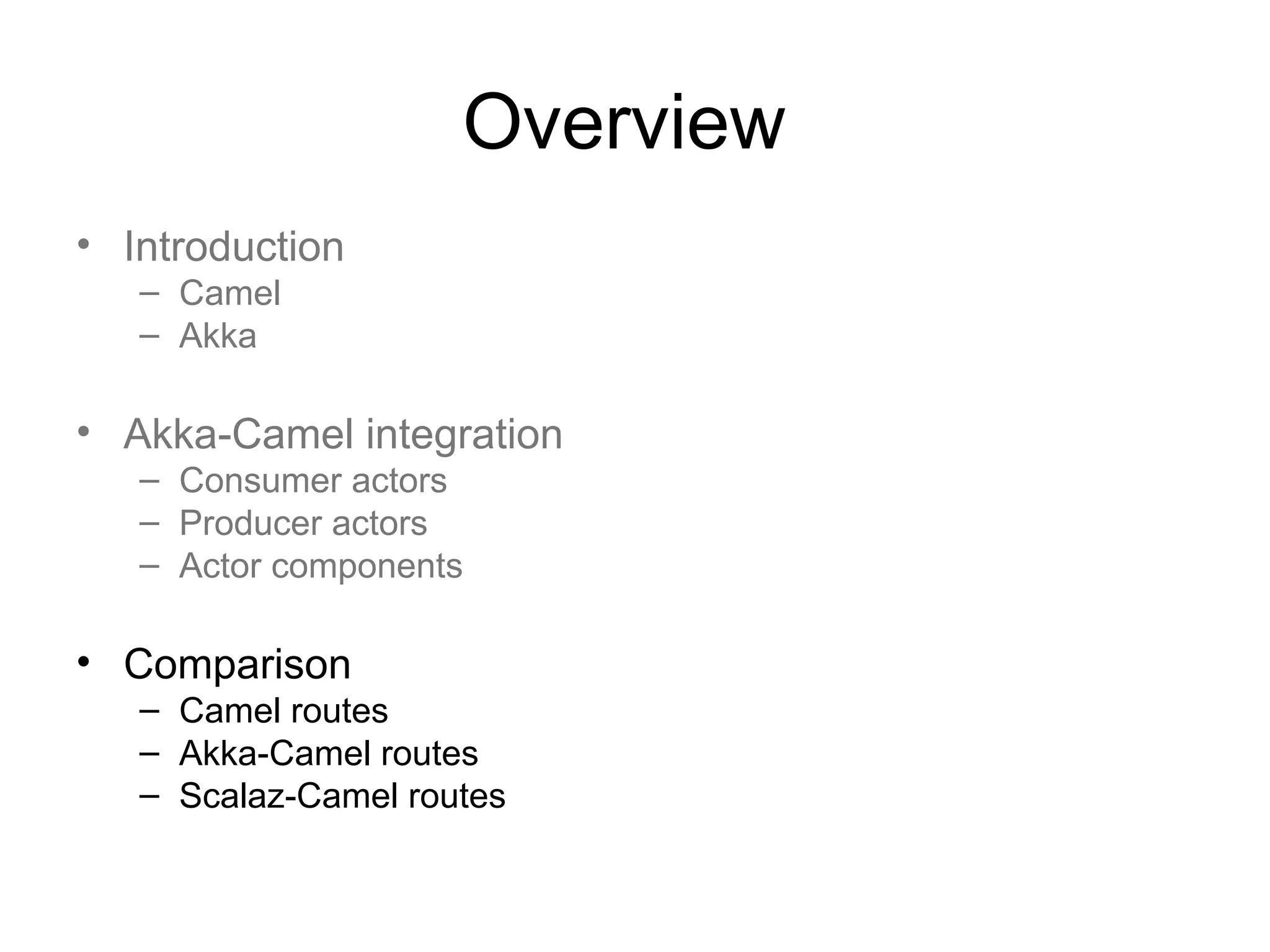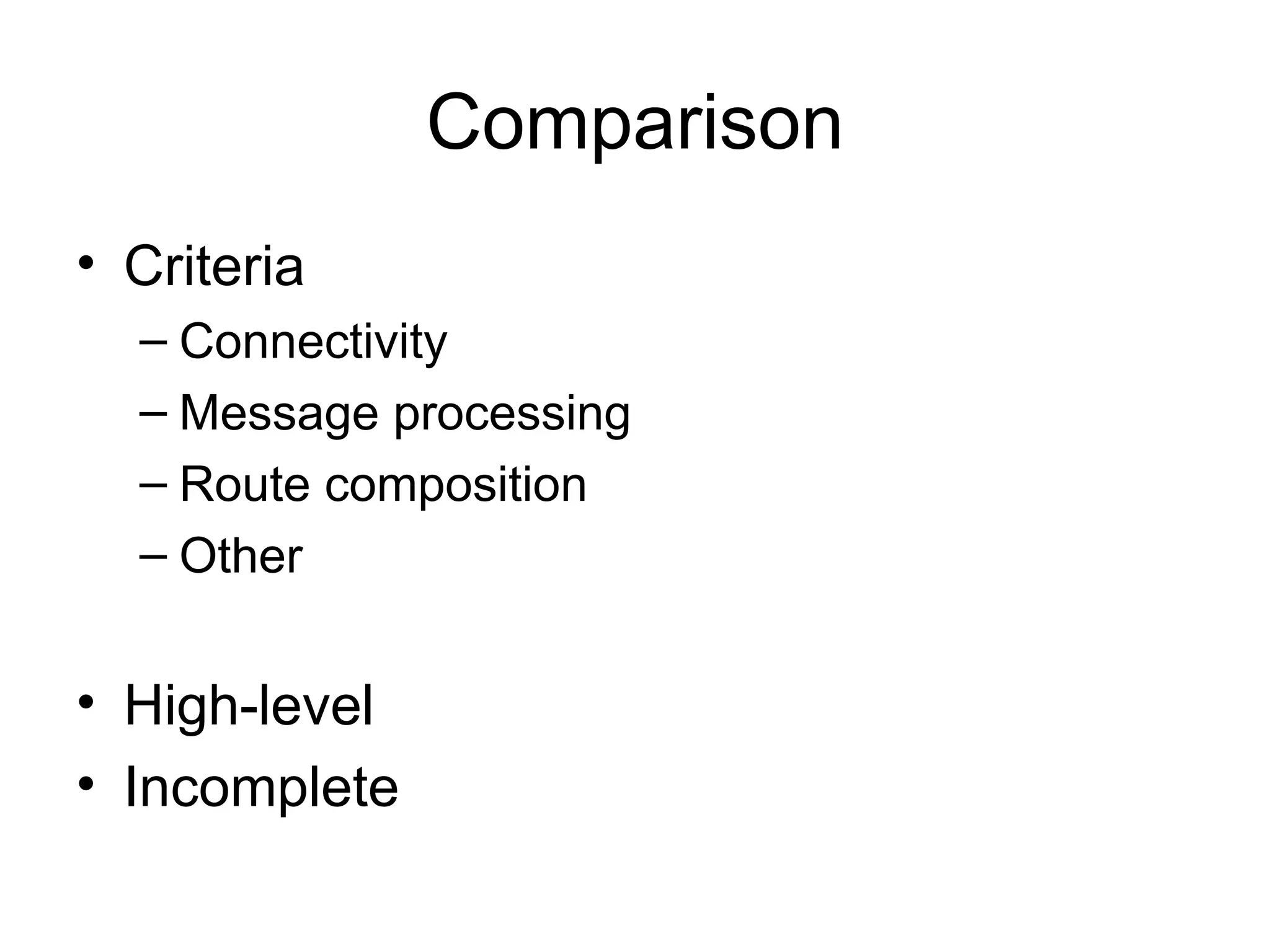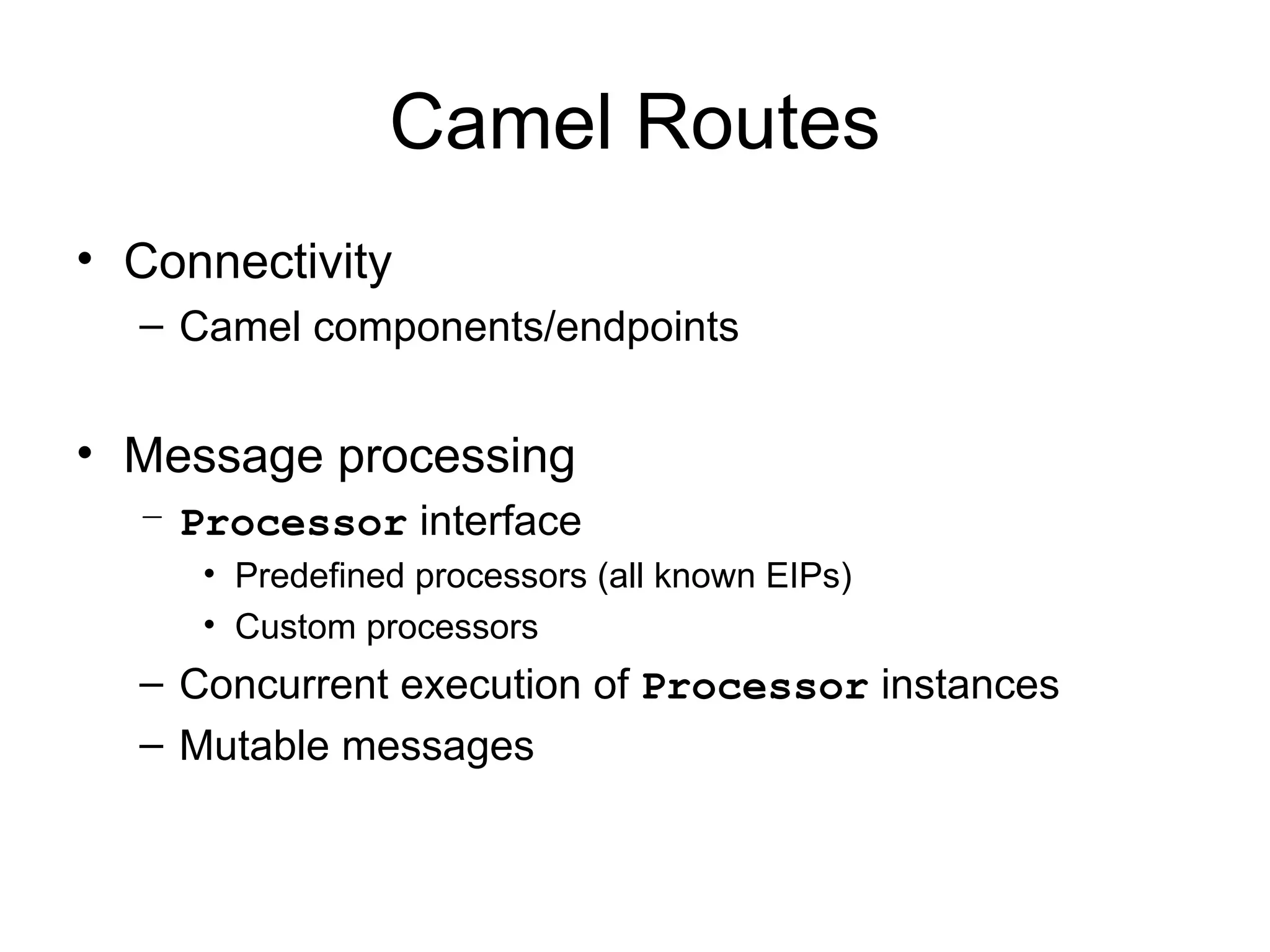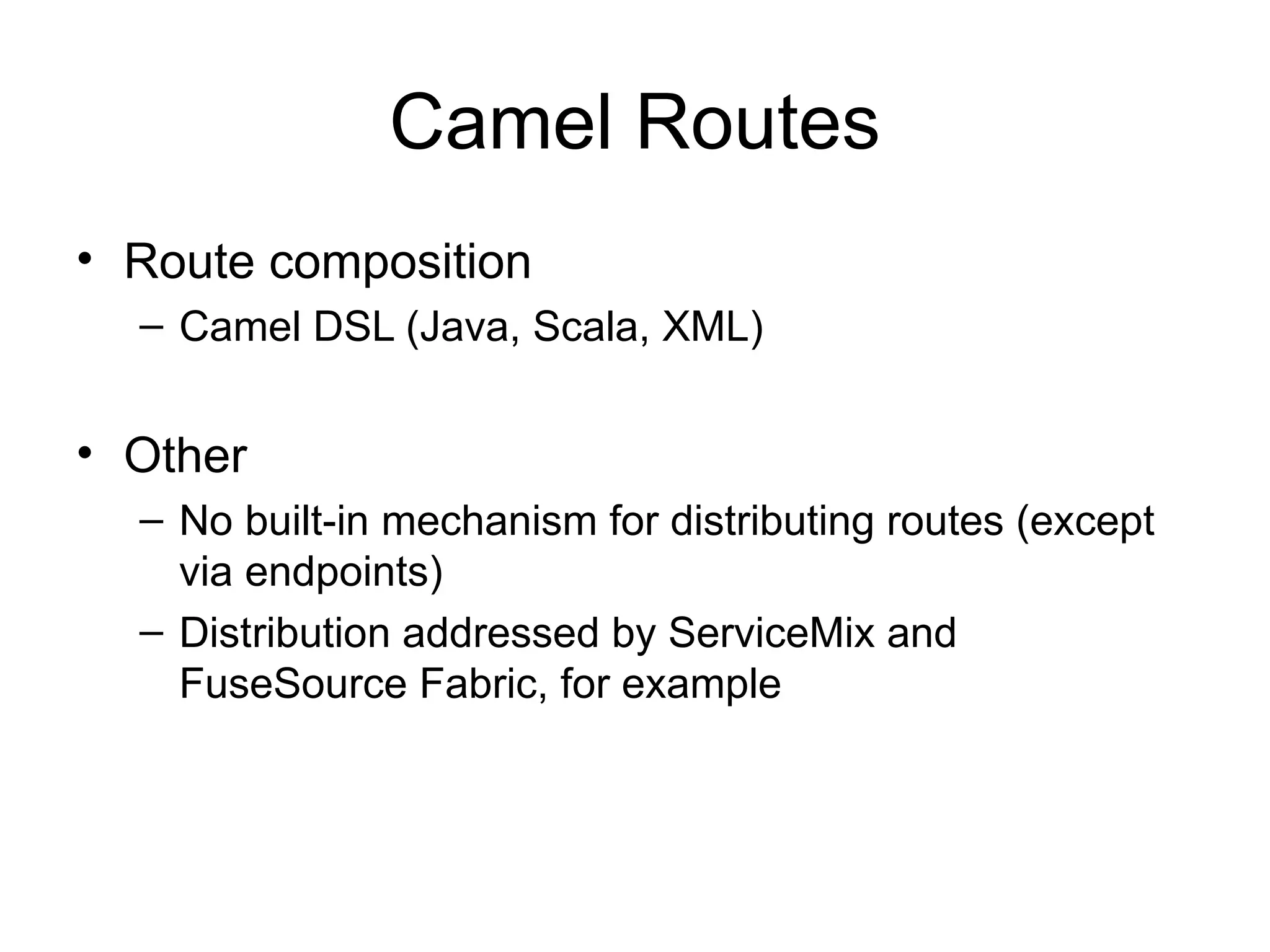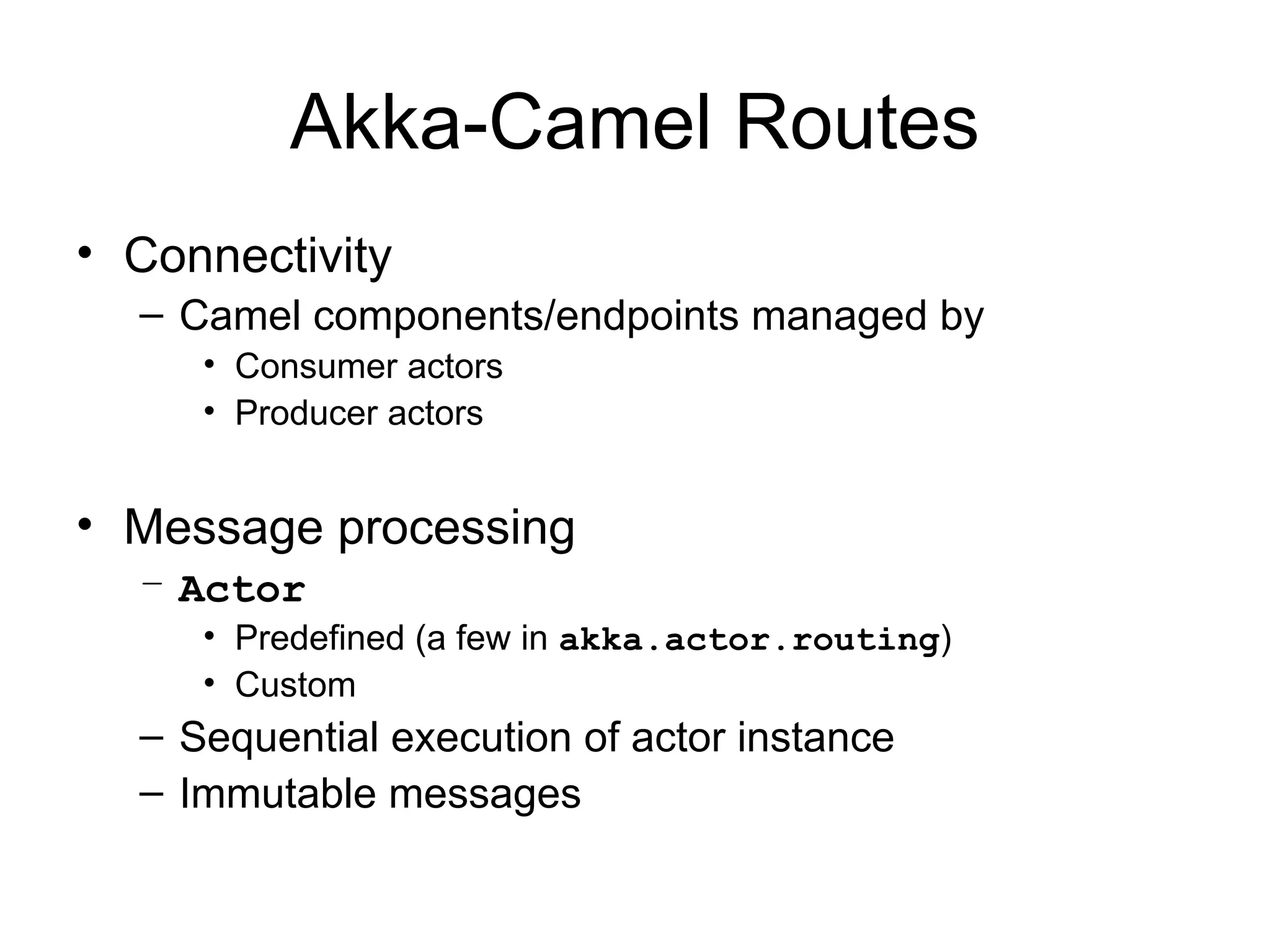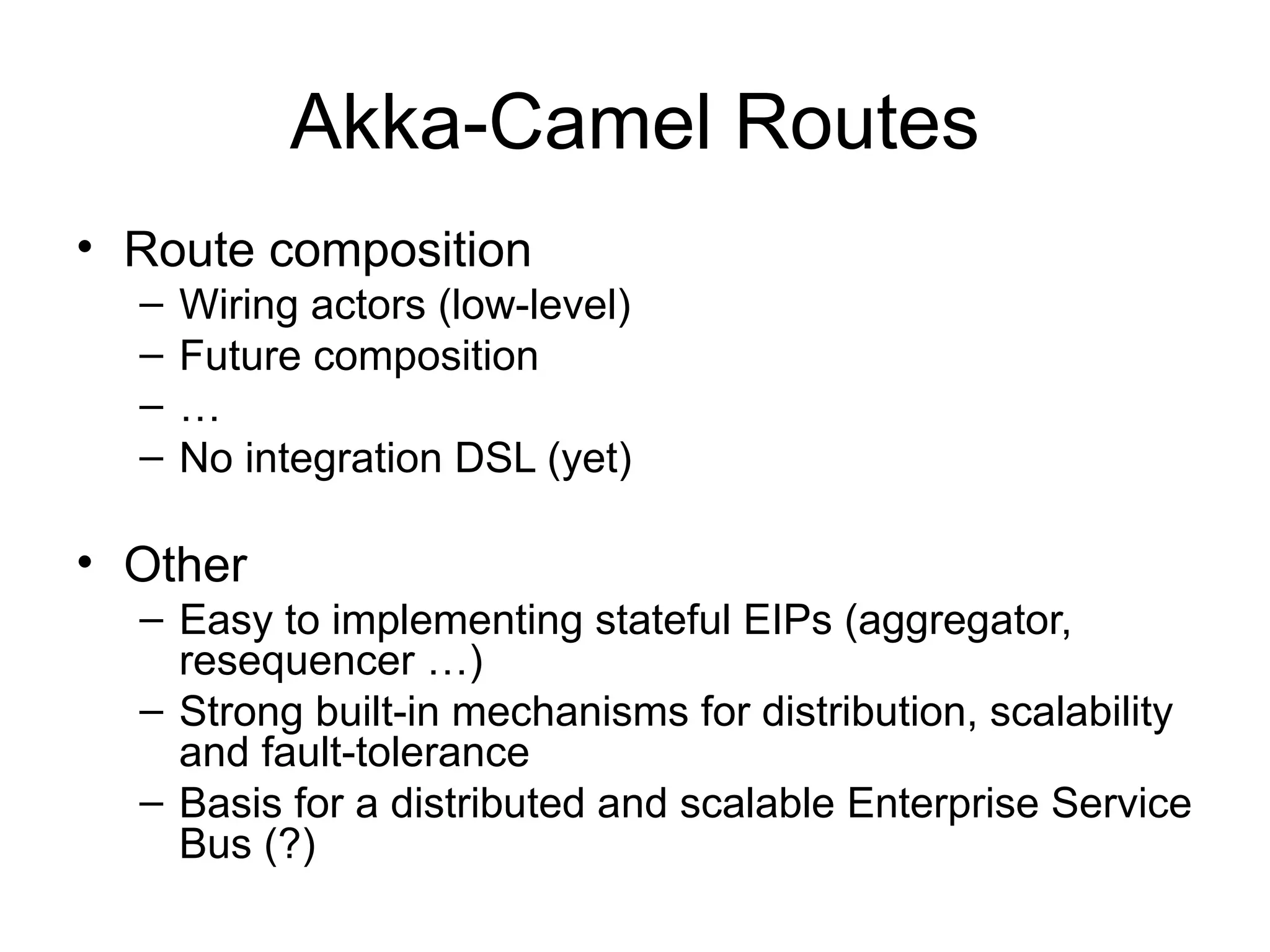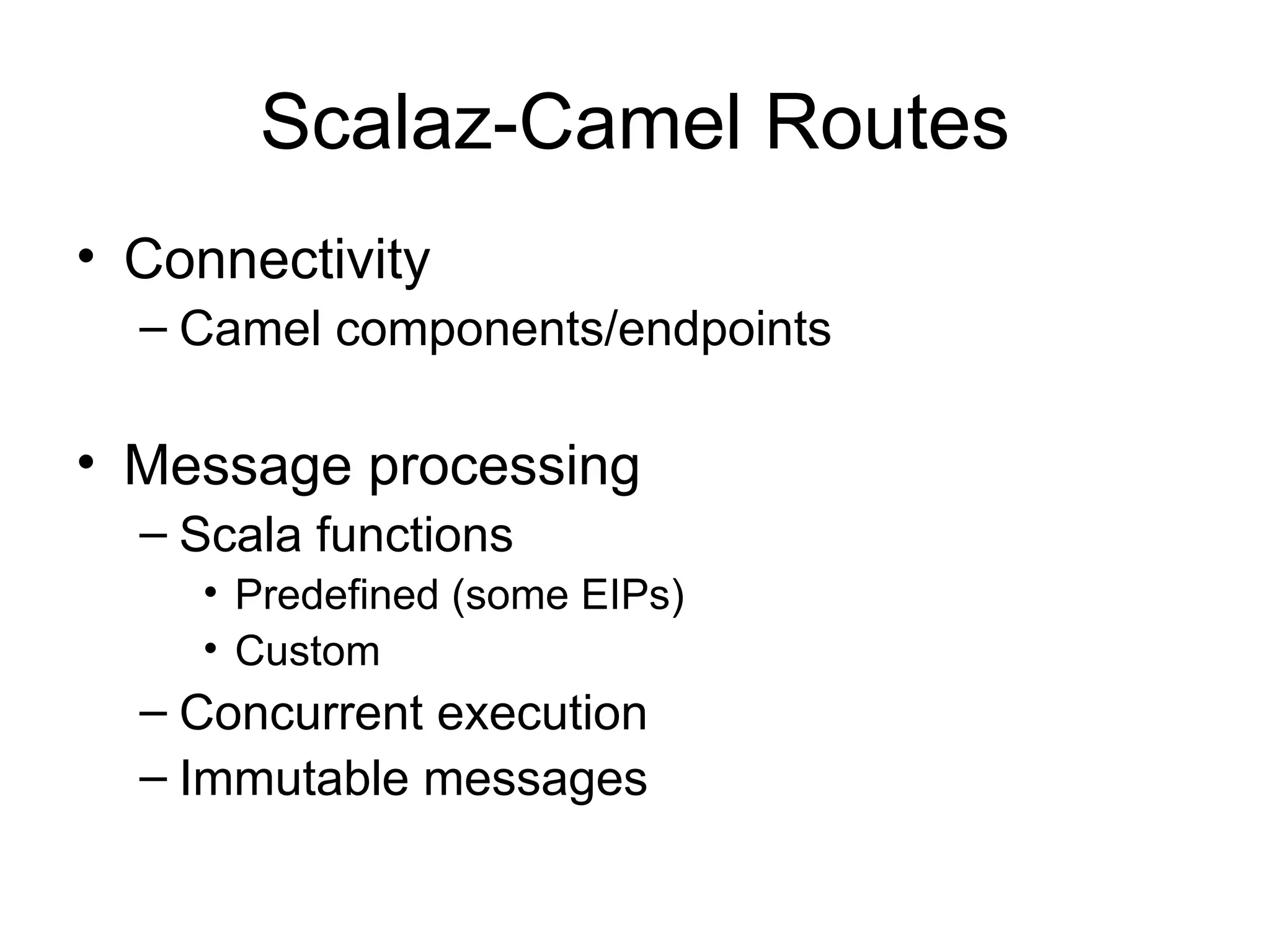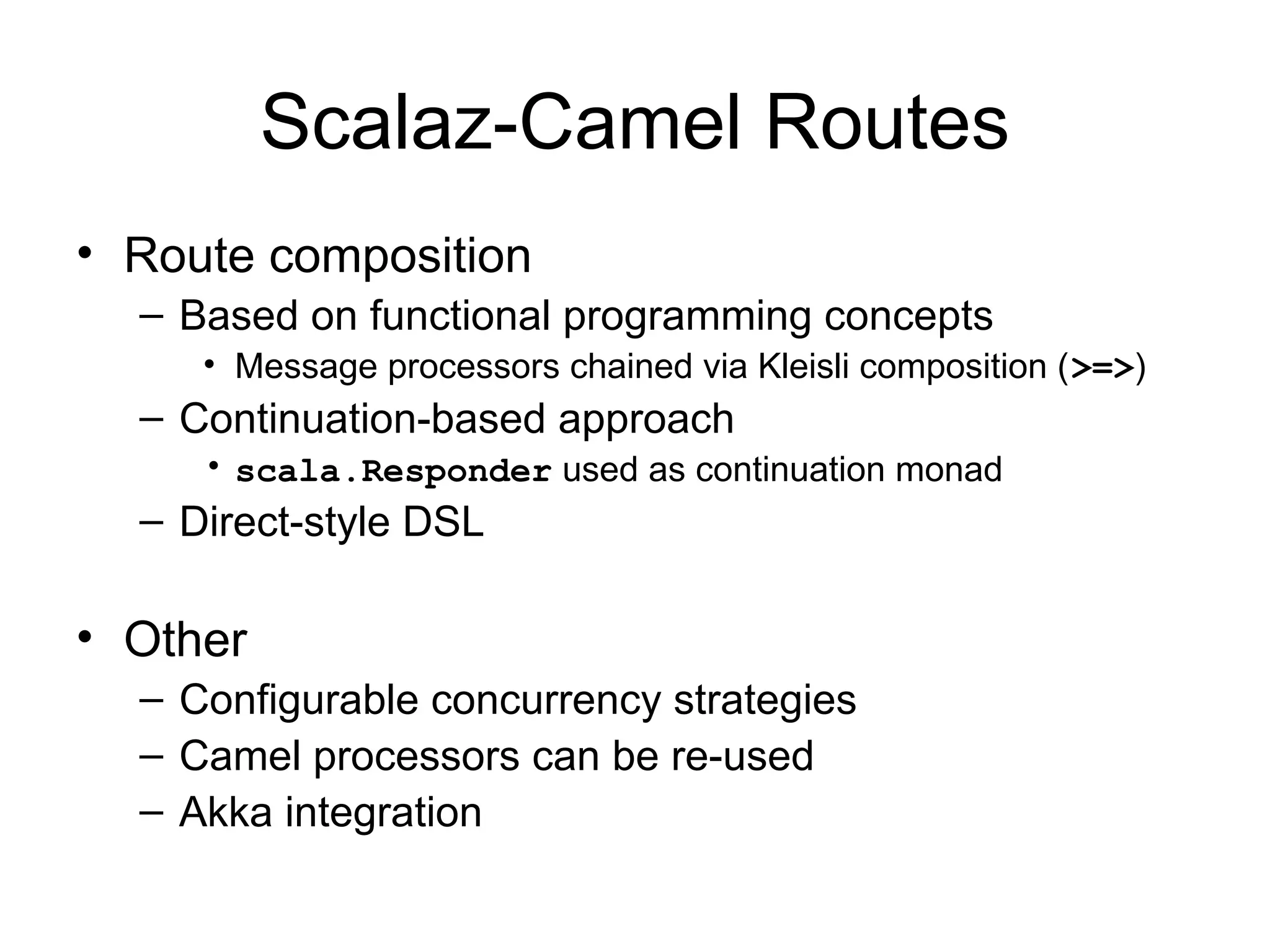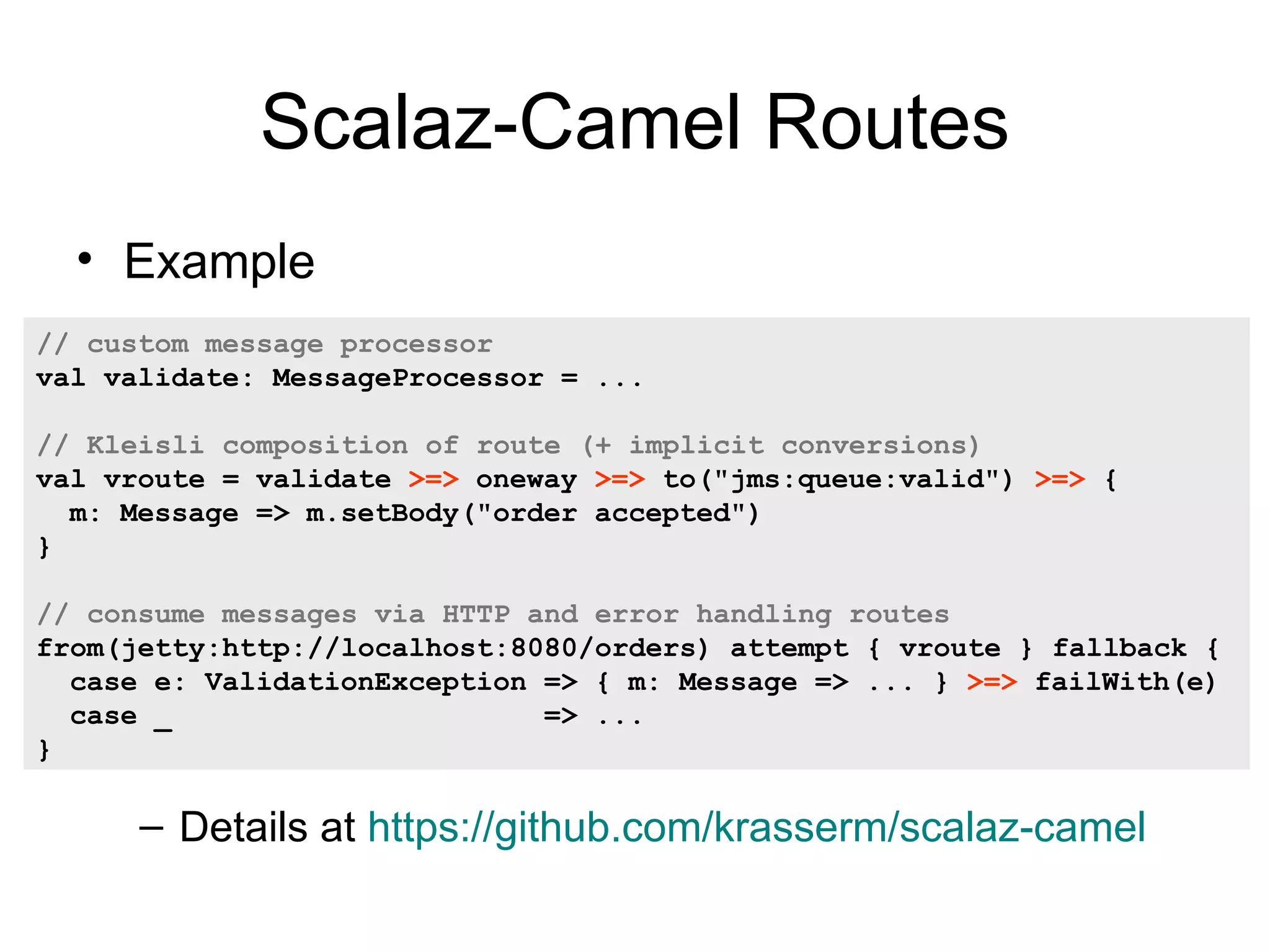This document summarizes the Apache Camel integration framework and how it can be used with Akka actors. Camel provides a domain-specific language and components for integration patterns and protocols. Akka actors handle asynchronous message processing and can be used as Camel consumers and producers through Akka-Camel integration. Consumer actors receive messages from Camel endpoints, while producer actors send messages to endpoints. Actor components allow actors to be used directly in Camel routes.
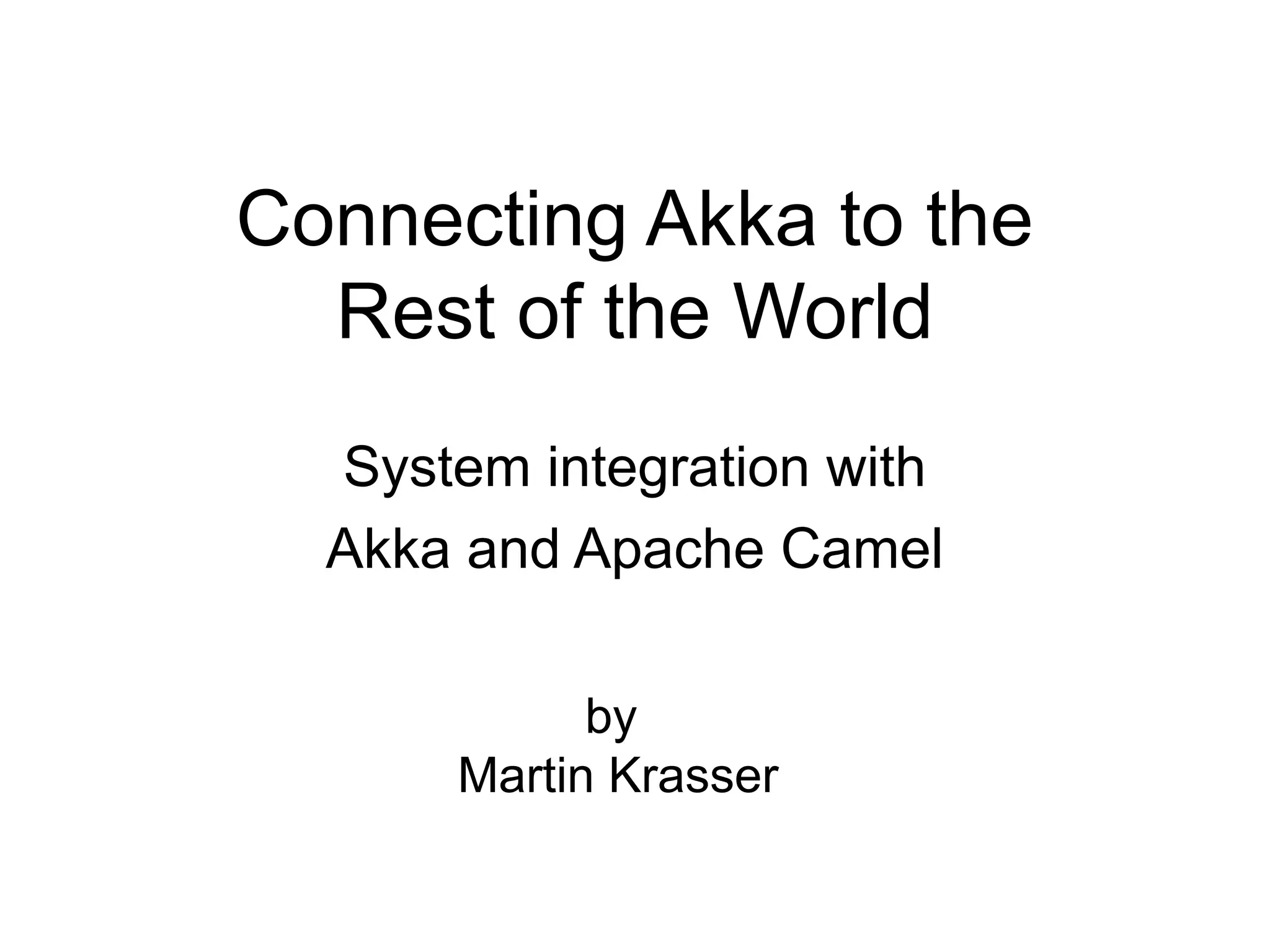
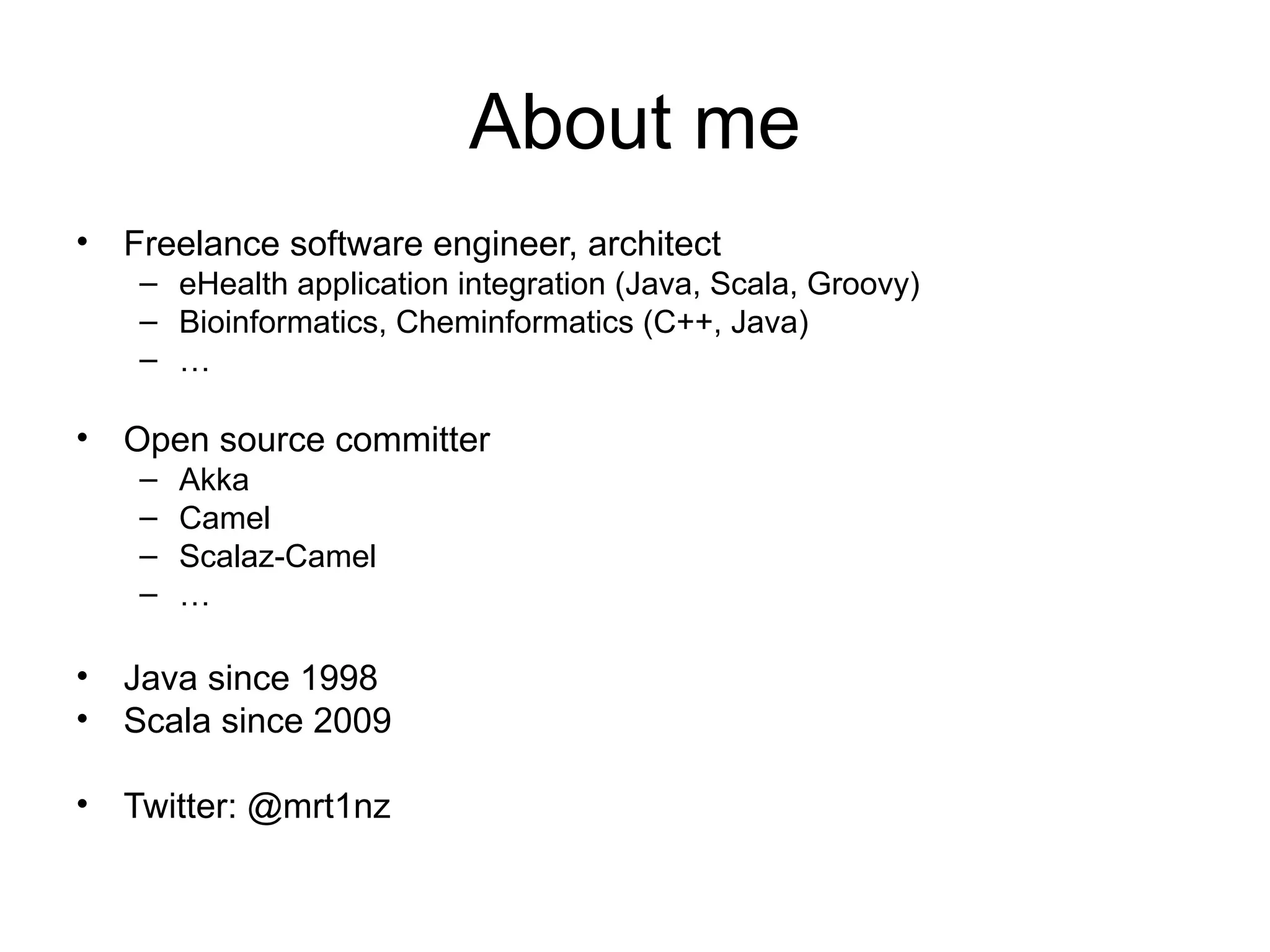
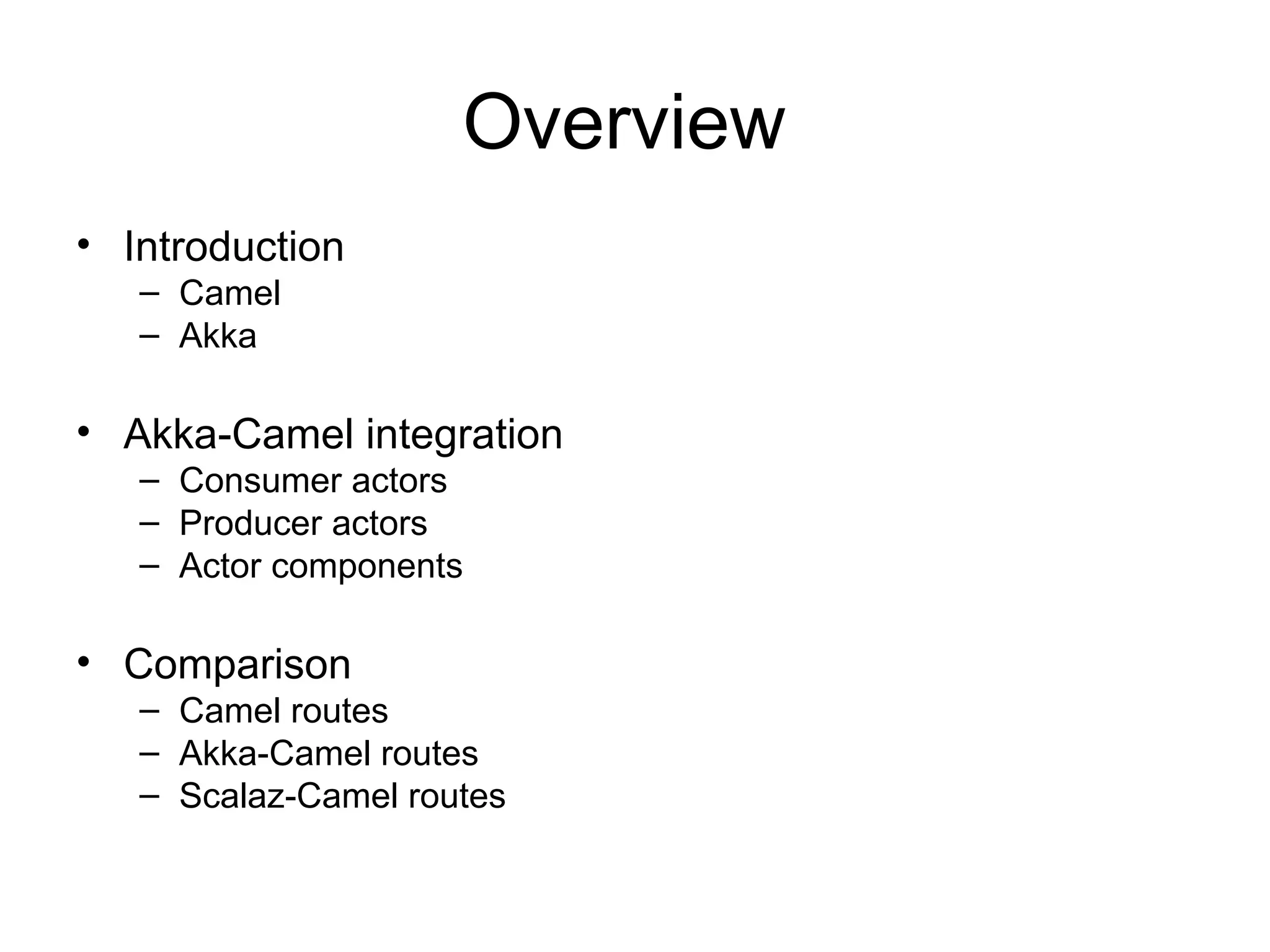
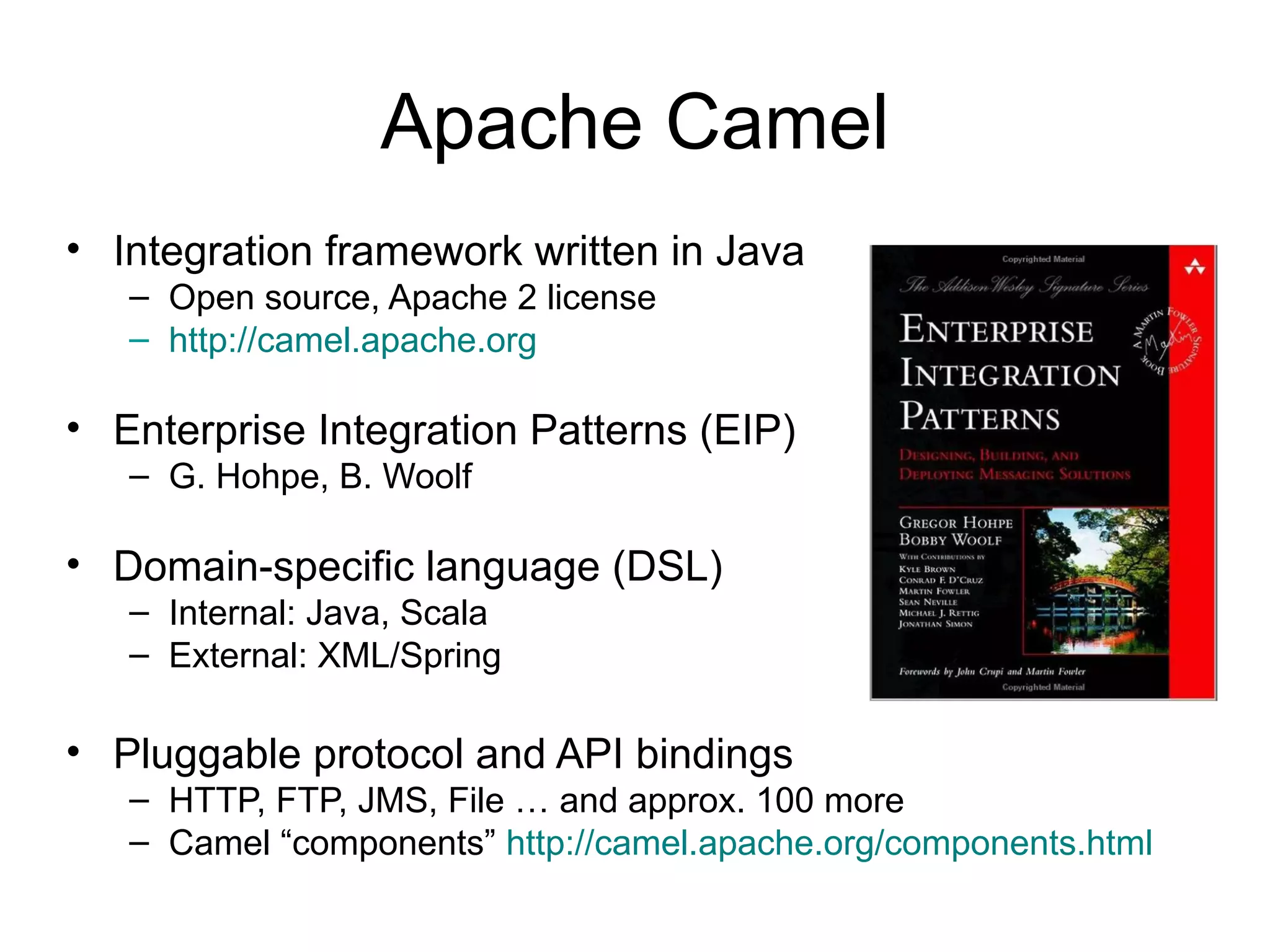
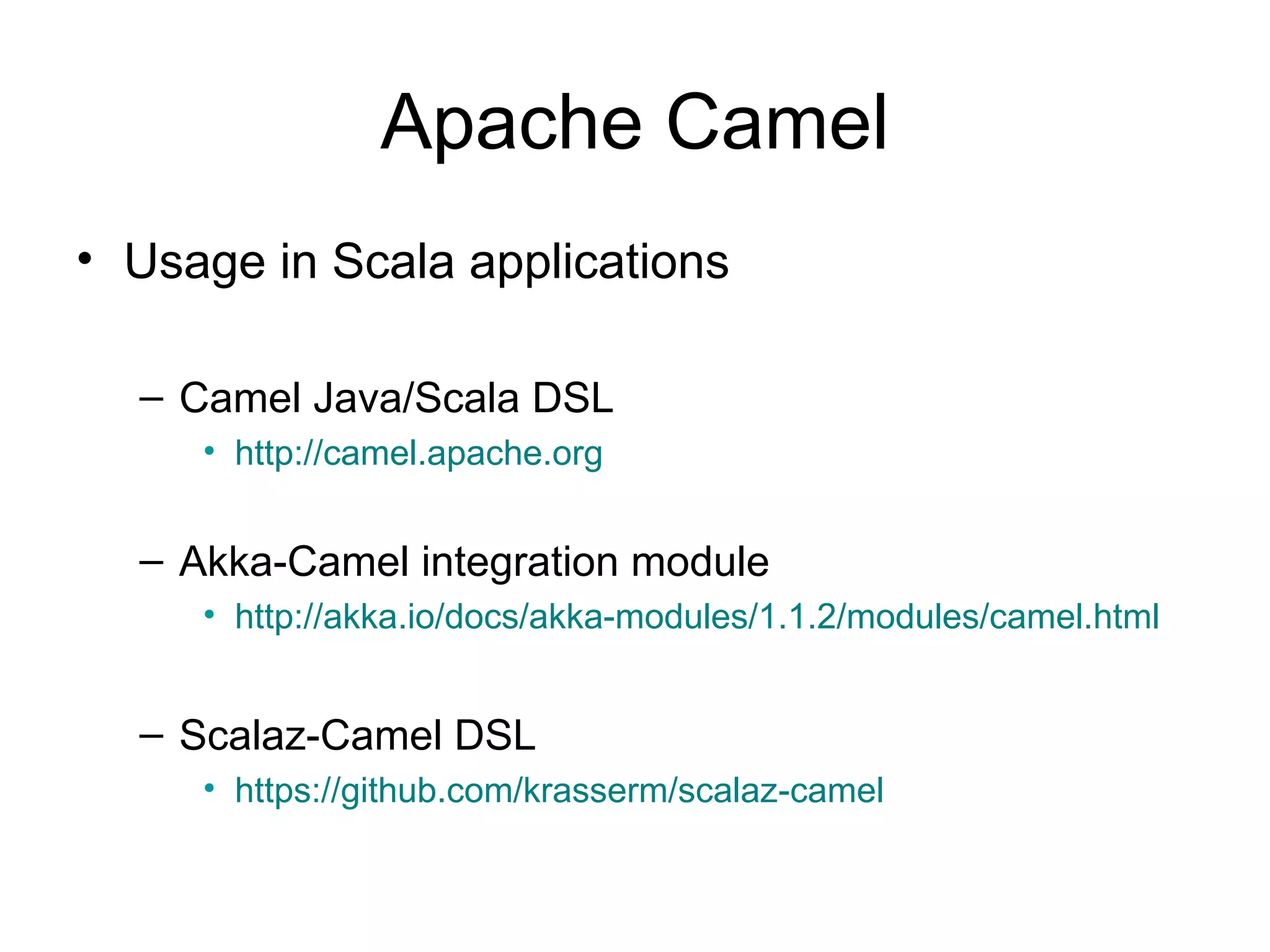
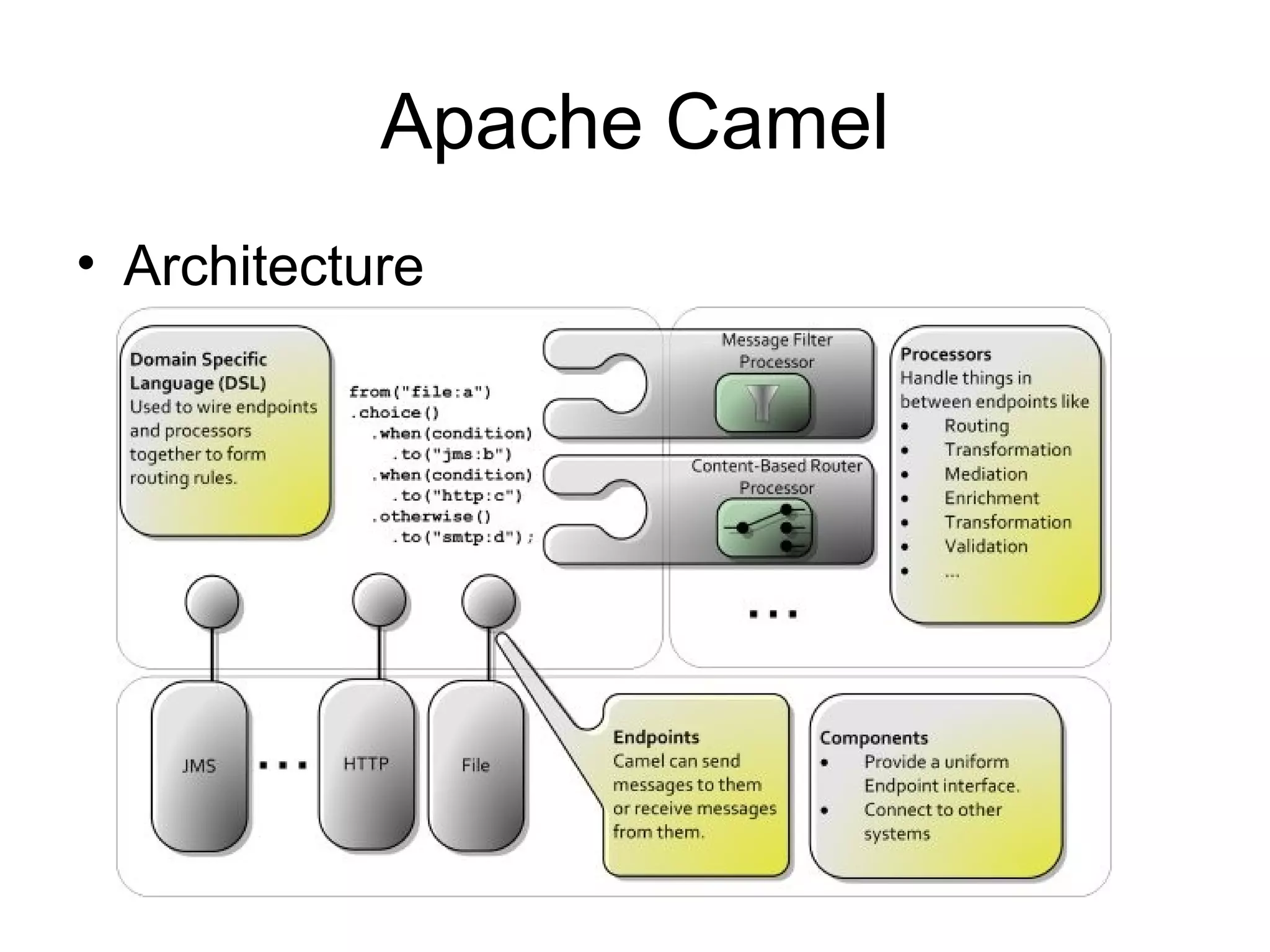
![Apache Camel • Routing example D D HTTP jms:queue:docs JMS HTTP Filter Endpoint Endpoint http://example.org/docs Java DSL: from("jms:queue:docs") .filter().xpath("/person[@name='Jon']") .to("http:example.org/docs"); Scala DSL: "jms:queue:docs" when(_.in == "…") to("http:example.org/docs");](https://image.slidesharecdn.com/scalax-2011-akka-camel-110617133702-phpapp01/75/System-Integration-with-Akka-and-Apache-Camel-7-2048.jpg)
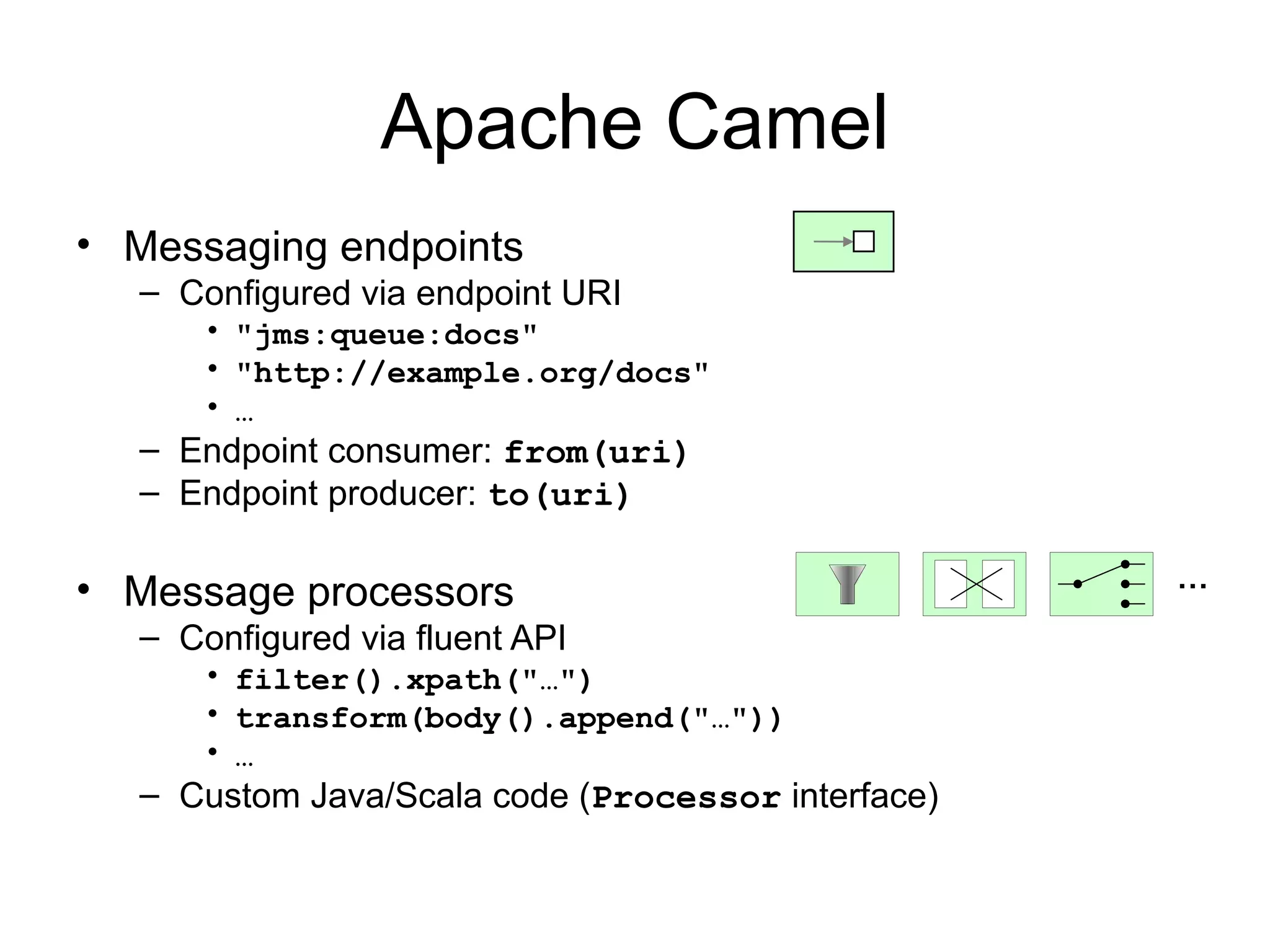
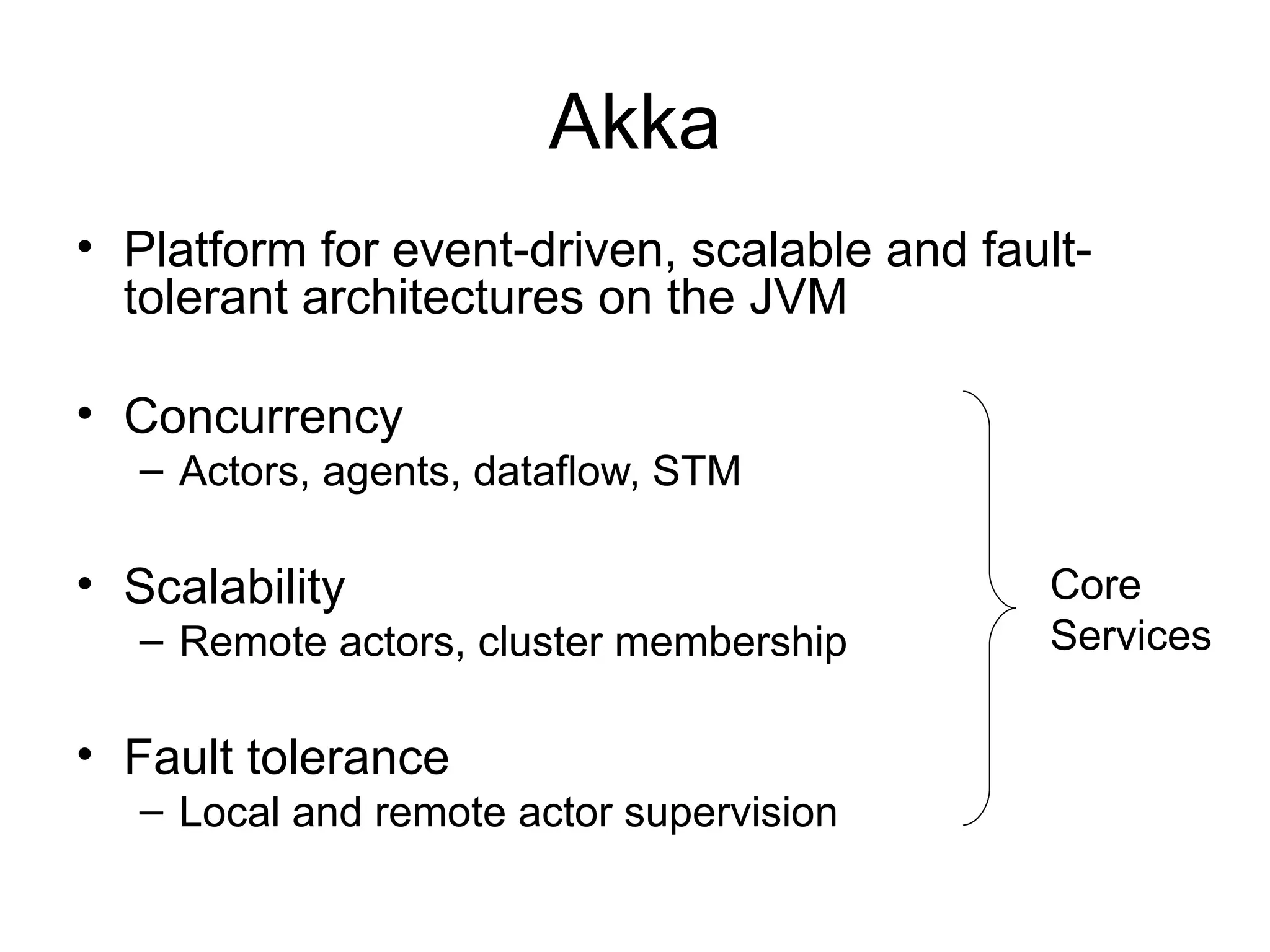
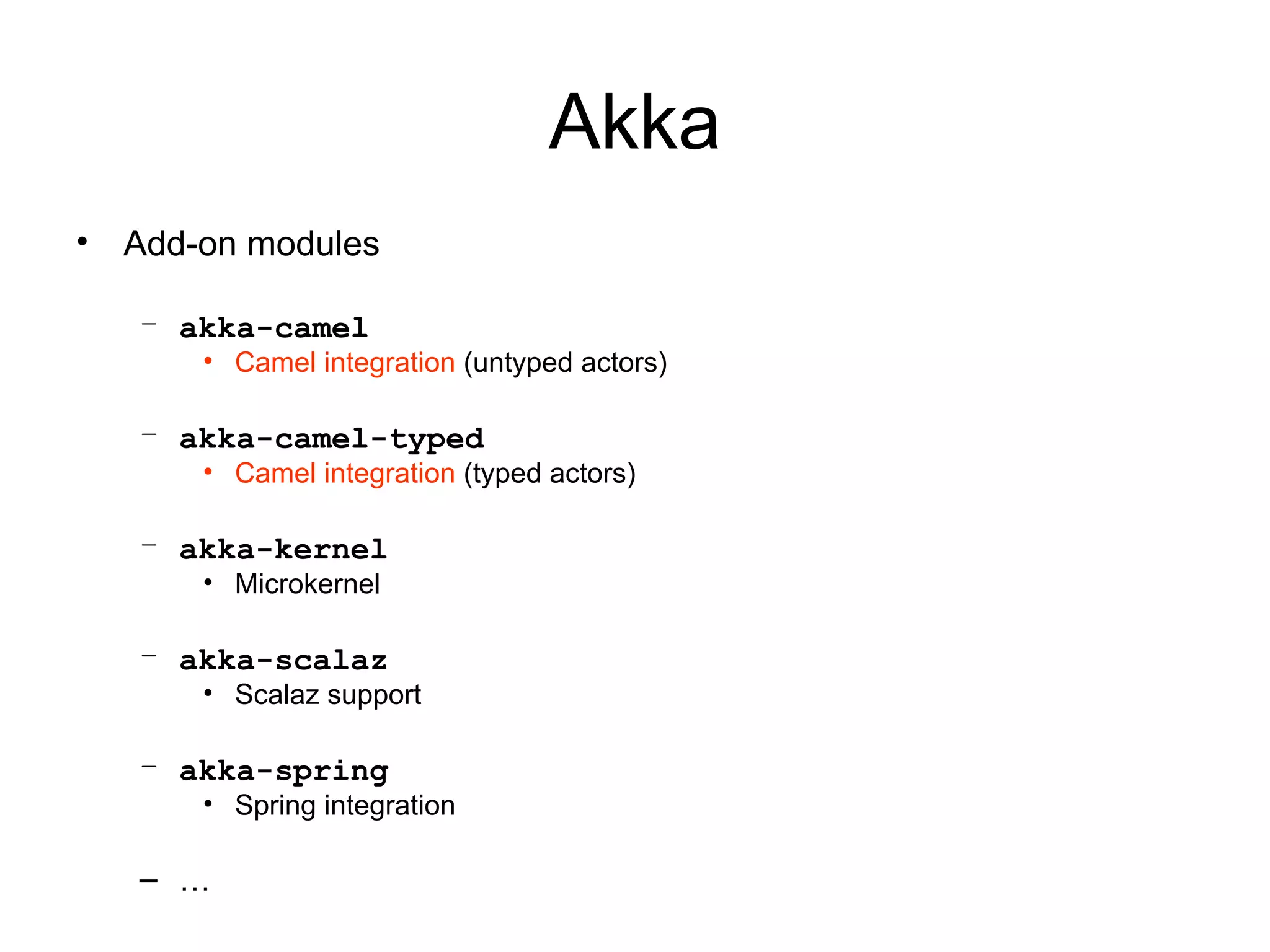
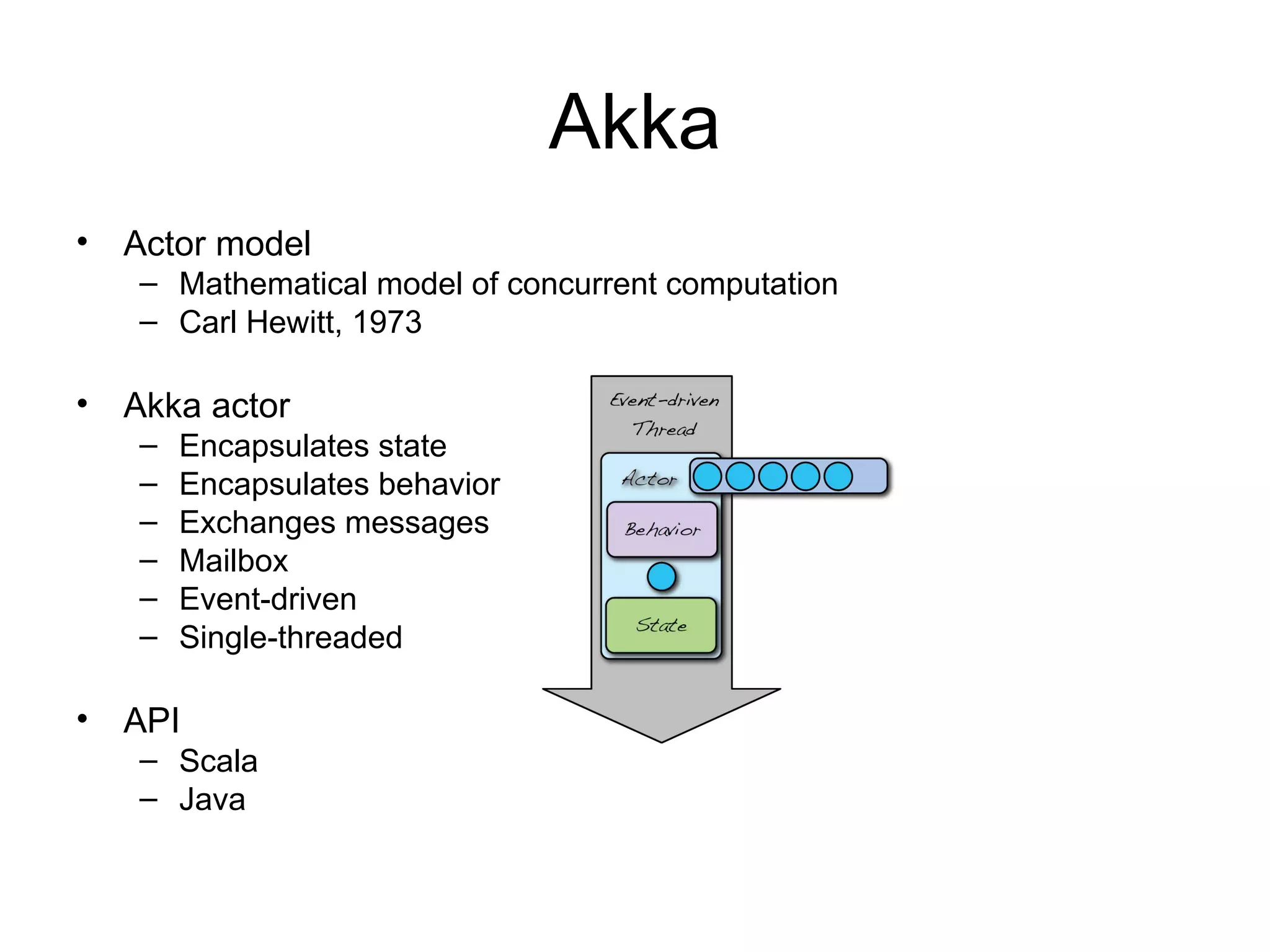
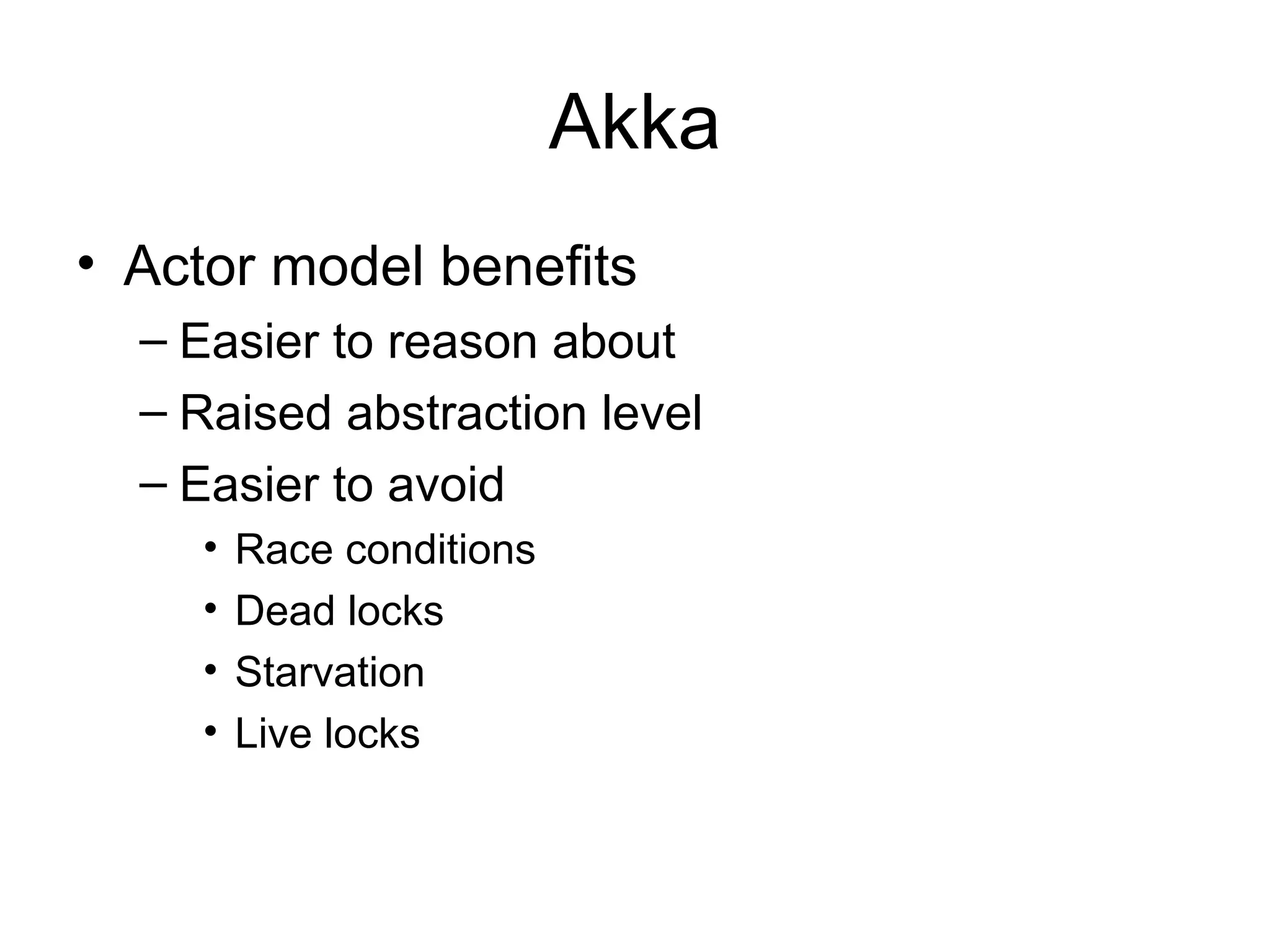
![Akka Actors • Receive messages import akka.actor.Actor // actor definition class ExampleActor extends Actor { def receive = { case "test" => … case _ => … } } // create actor reference (ActorRef) val actor = Actor.actorOf[ExampleActor] // start actor actor.start](https://image.slidesharecdn.com/scalax-2011-akka-camel-110617133702-phpapp01/75/System-Integration-with-Akka-and-Apache-Camel-13-2048.jpg)
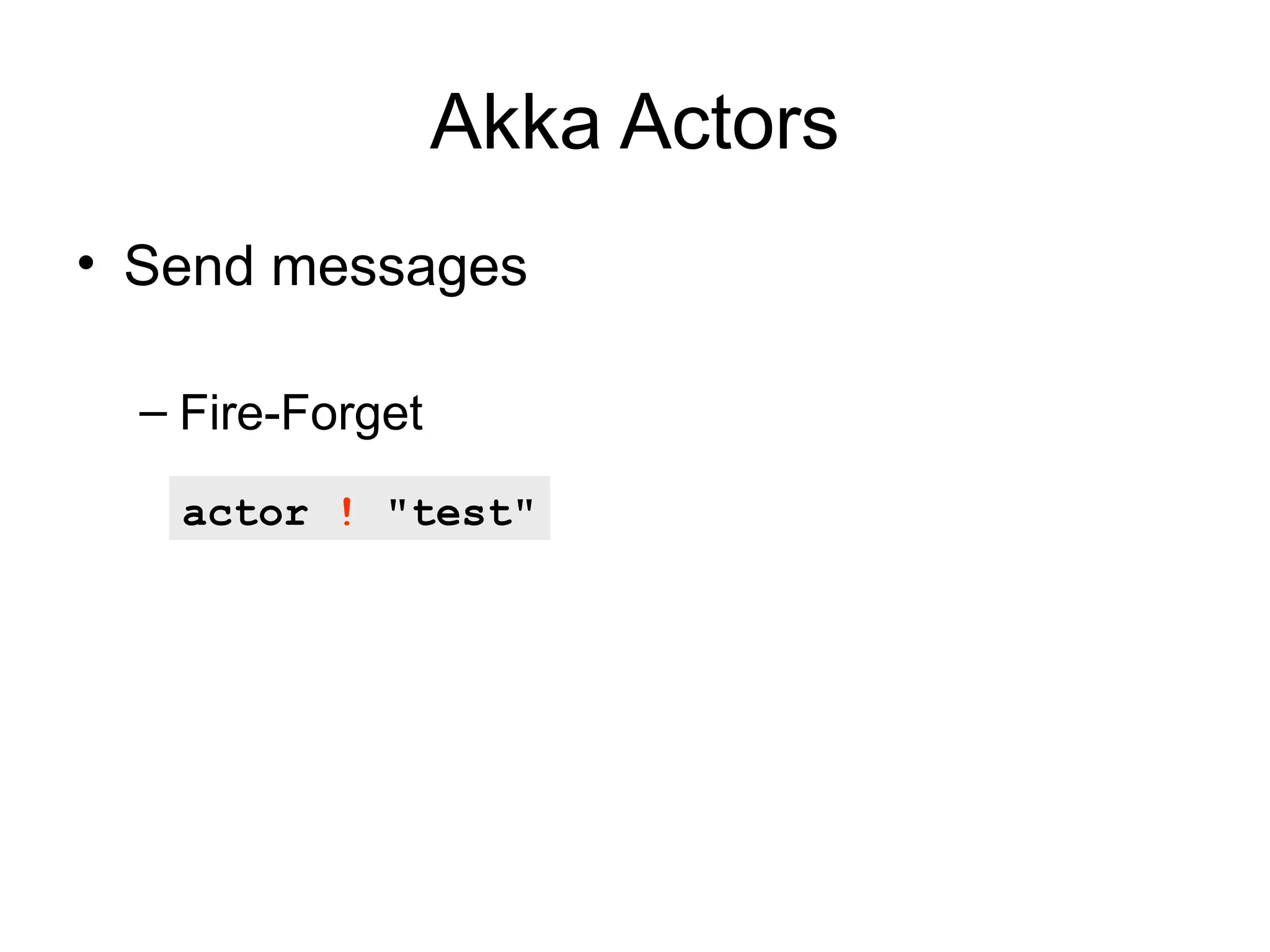
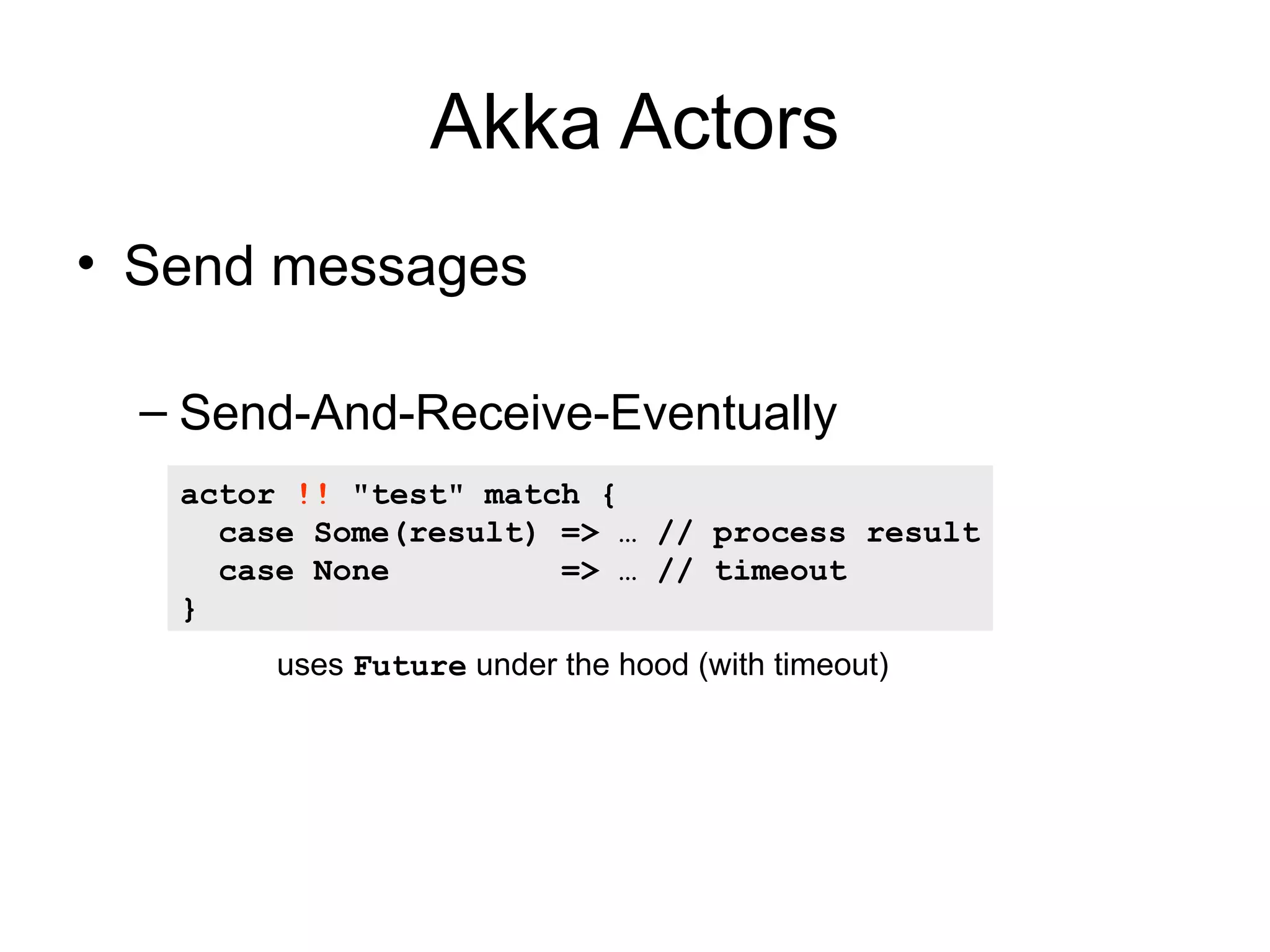
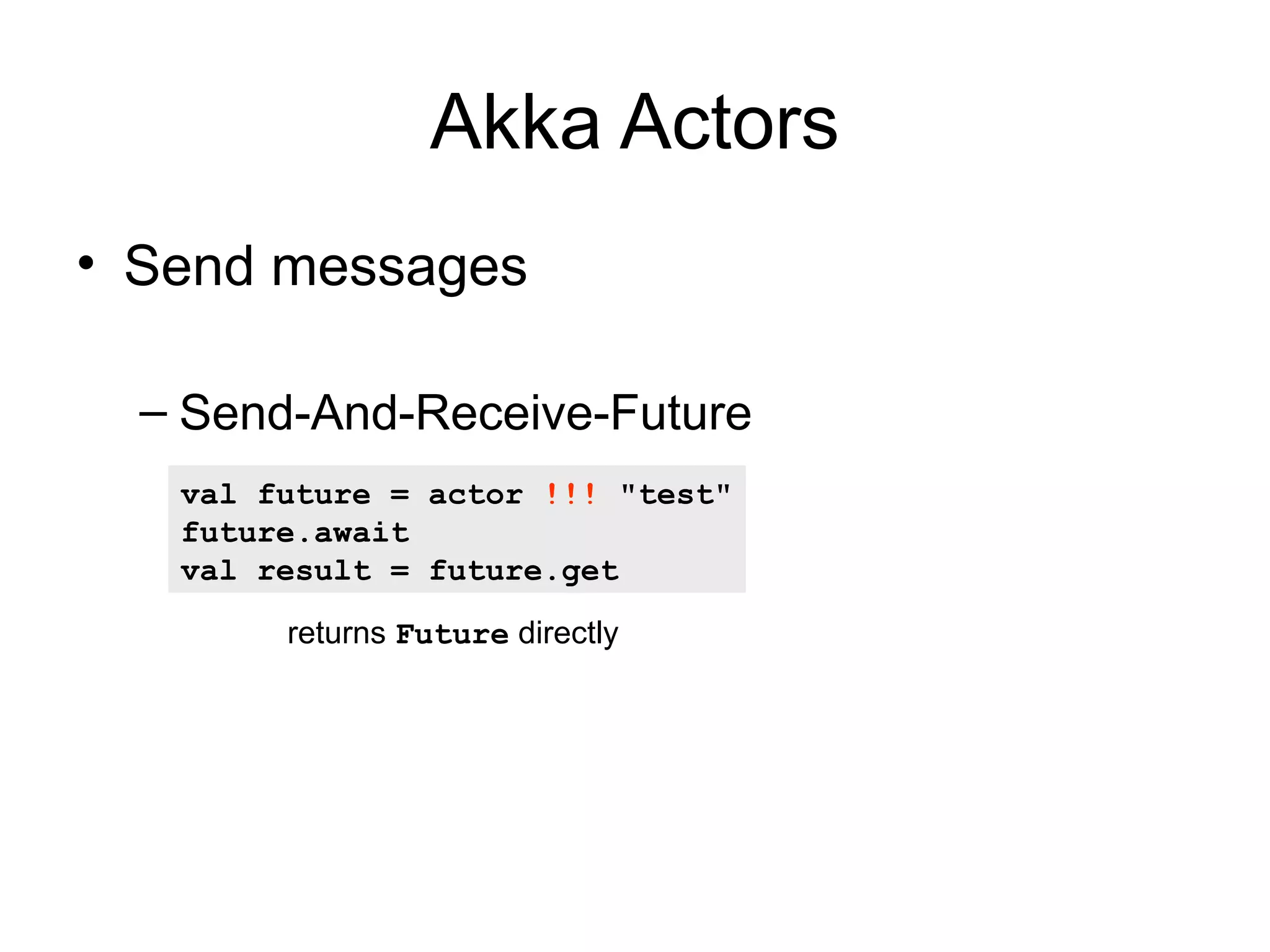
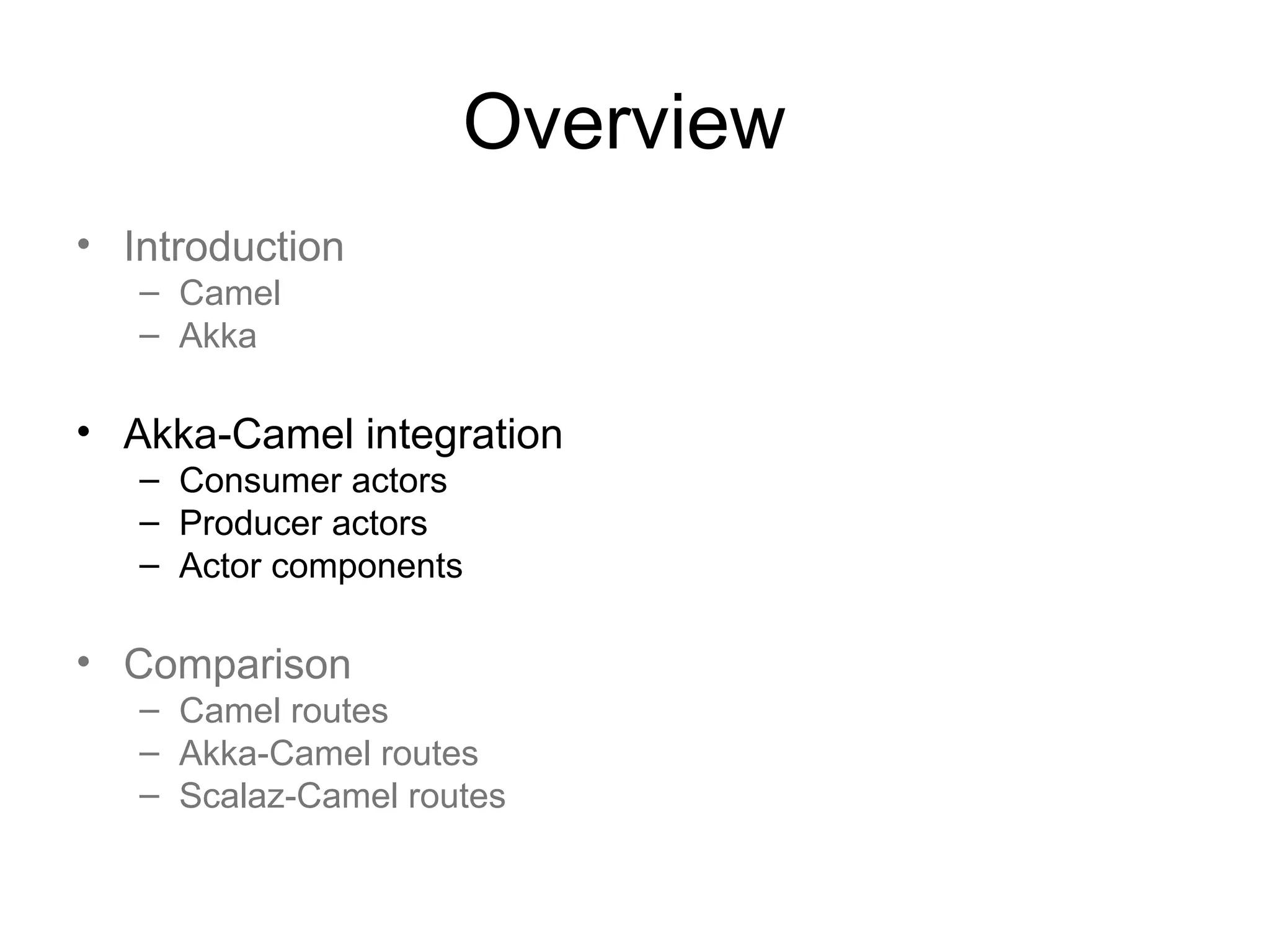
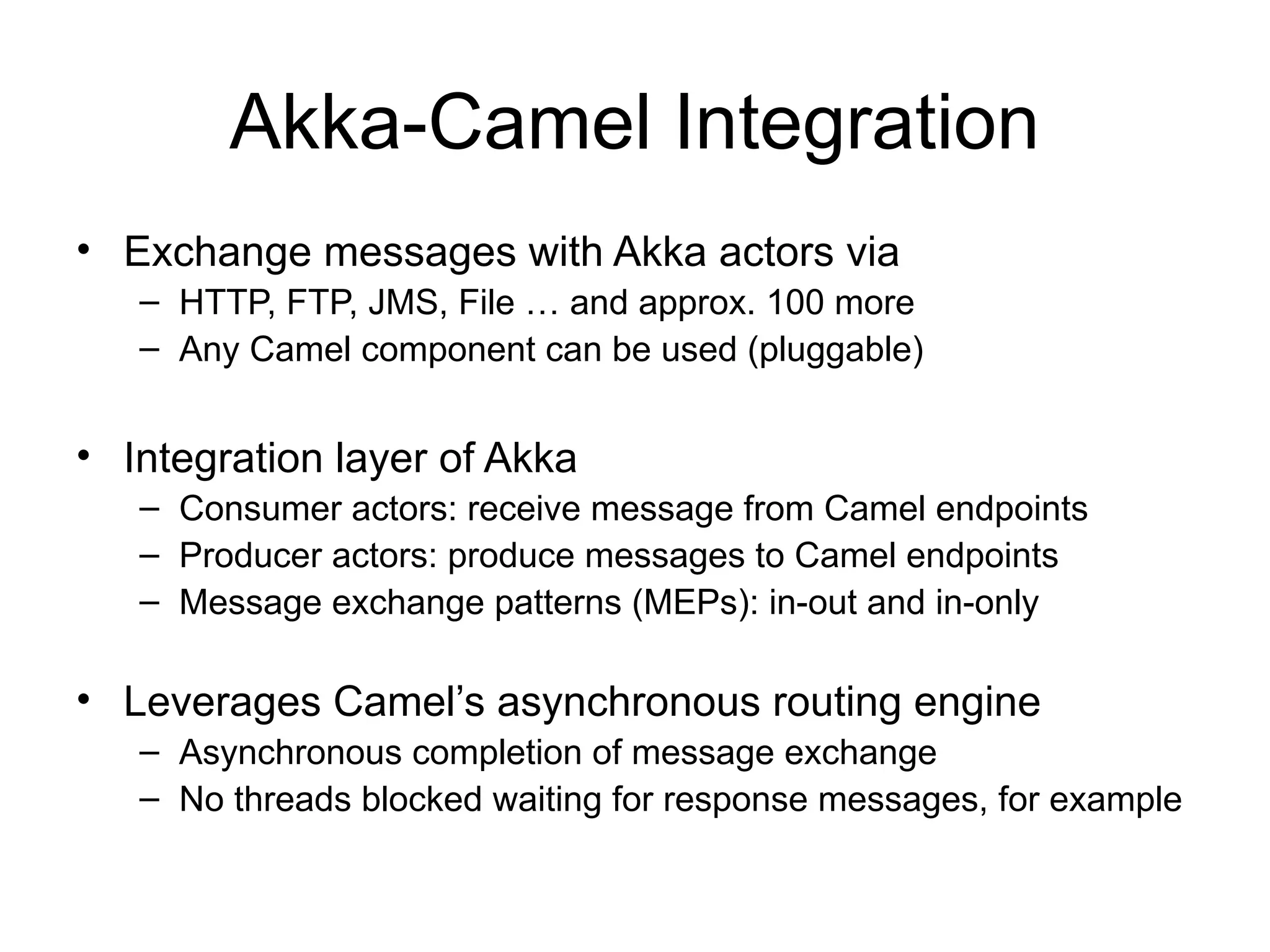
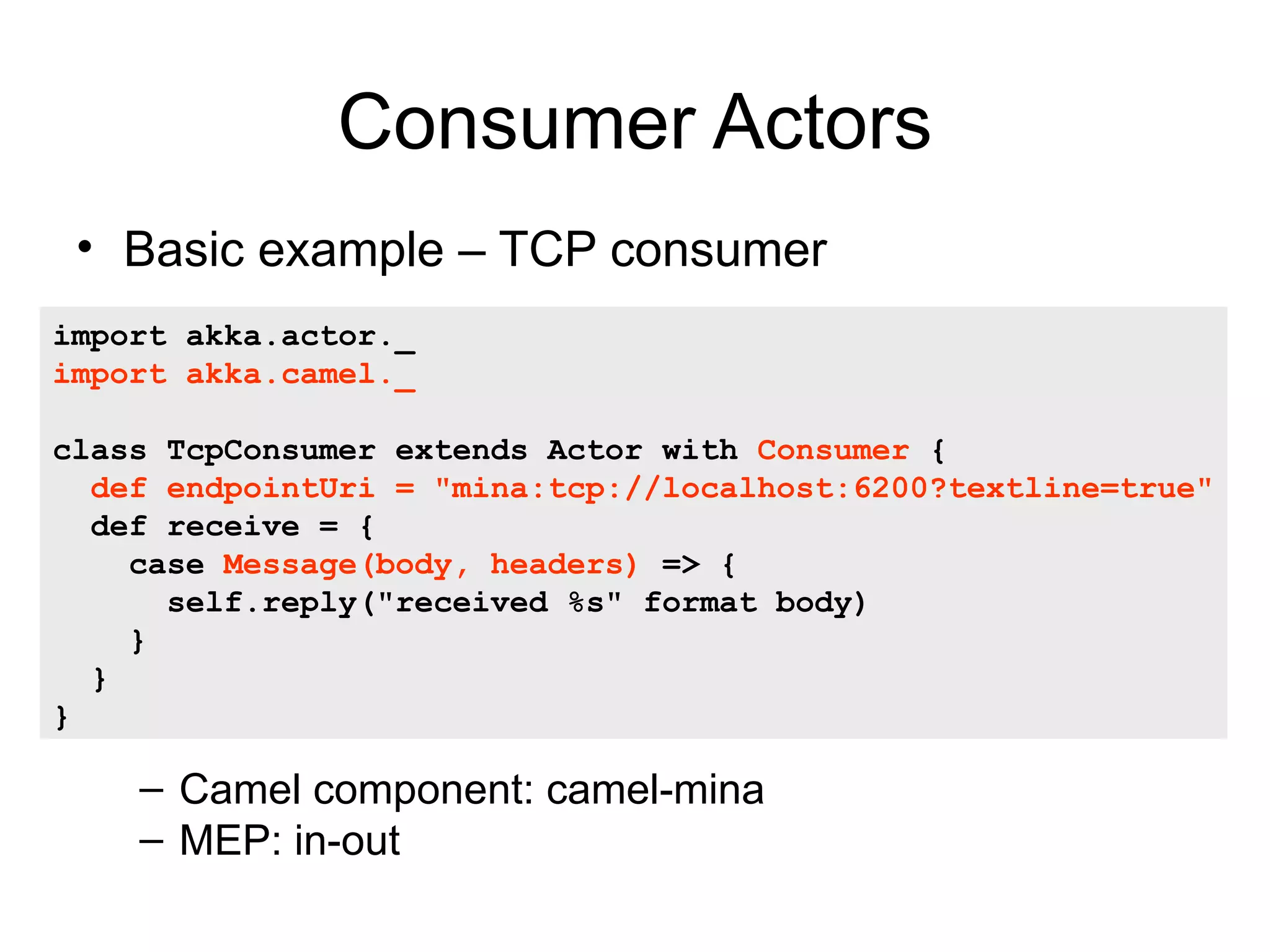
![Consumer Actors • Basic example – TCP consumer activation import akka.actor._ import akka.camel._ // Consumer actors require a running CamelService CamelServiceManager.startCamelService // Activate TCP endpoint (asynchronously) Actor.actorOf[TcpConsumer].start – Asynchronous activation of consumer endpoint](https://image.slidesharecdn.com/scalax-2011-akka-camel-110617133702-phpapp01/75/System-Integration-with-Akka-and-Apache-Camel-20-2048.jpg)
![Consumer Actors • Basic example – TCP consumer activation import akka.actor._ import akka.camel._ // Consumer actors require a running CamelService val service = CamelServiceManager.startCamelService // Wait for TCP endpoint activation service.awaitEndpointActivation(1) { Actor.actorOf[TcpConsumer].start } – Wait for endpoint activation – Useful for testing purposes](https://image.slidesharecdn.com/scalax-2011-akka-camel-110617133702-phpapp01/75/System-Integration-with-Akka-and-Apache-Camel-21-2048.jpg)
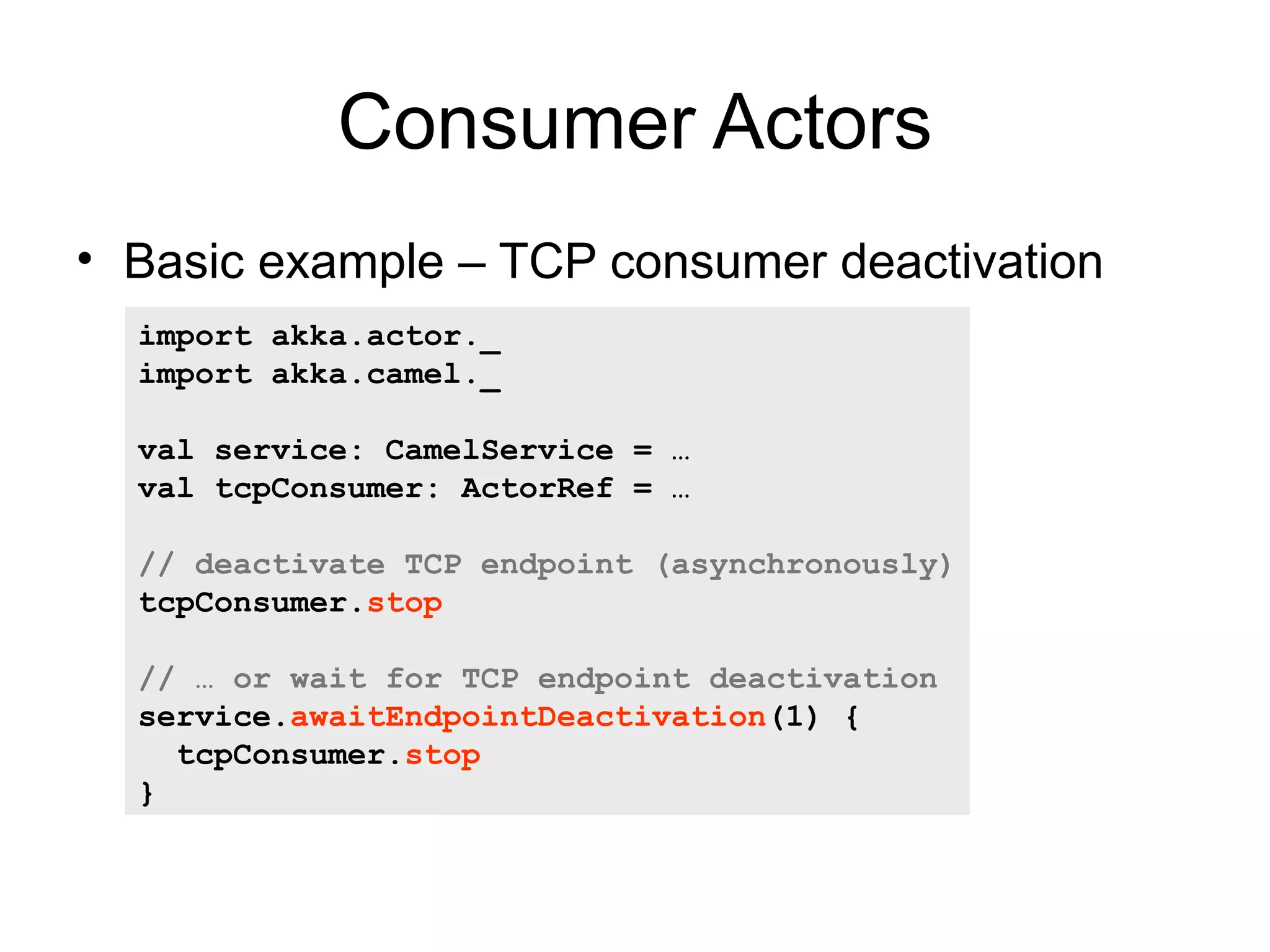
![Consumer Actors • Basic example – HTTP consumer class HttpConsumer extends Actor with Consumer { def endpointUri = "jetty:http://localhost:8080/example" def receive = { case msg: Message => { self.reply("received %s" format msg.bodyAs[String]) } } } – Camel component: camel-jetty – MEP: in-out – Jetty continuations used internally – Camel type converter (msg.bodyAs[…])](https://image.slidesharecdn.com/scalax-2011-akka-camel-110617133702-phpapp01/75/System-Integration-with-Akka-and-Apache-Camel-23-2048.jpg)
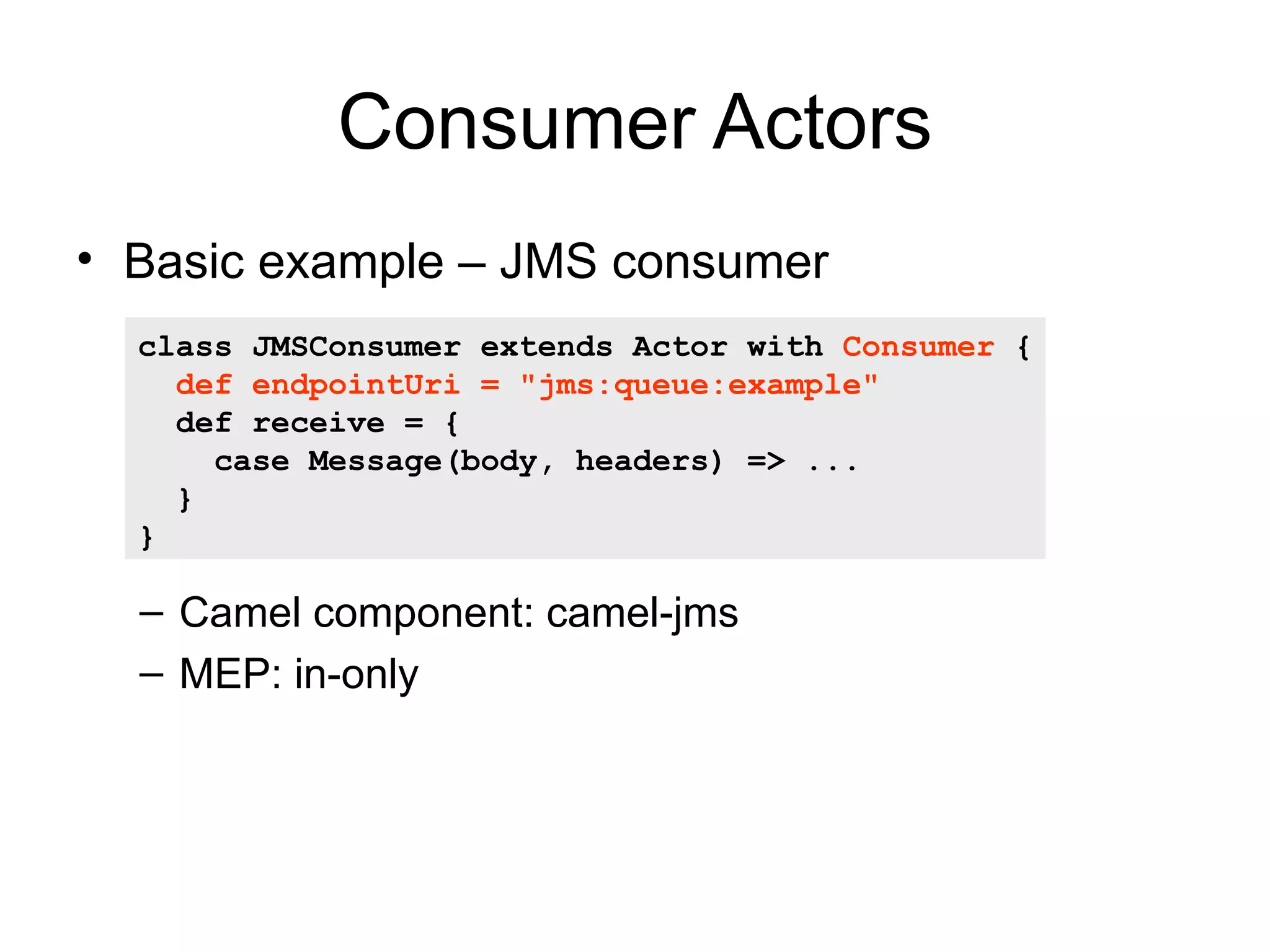
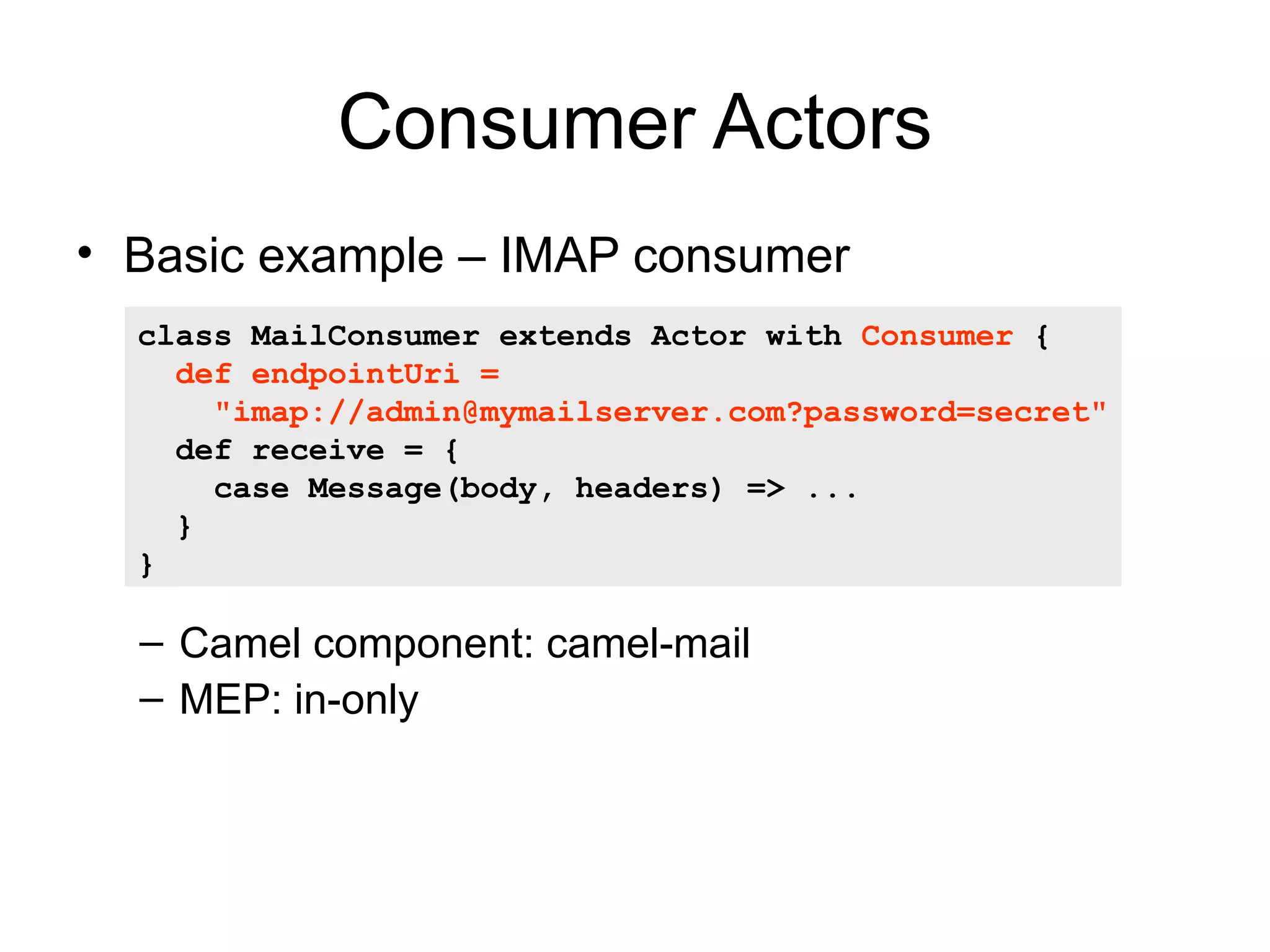
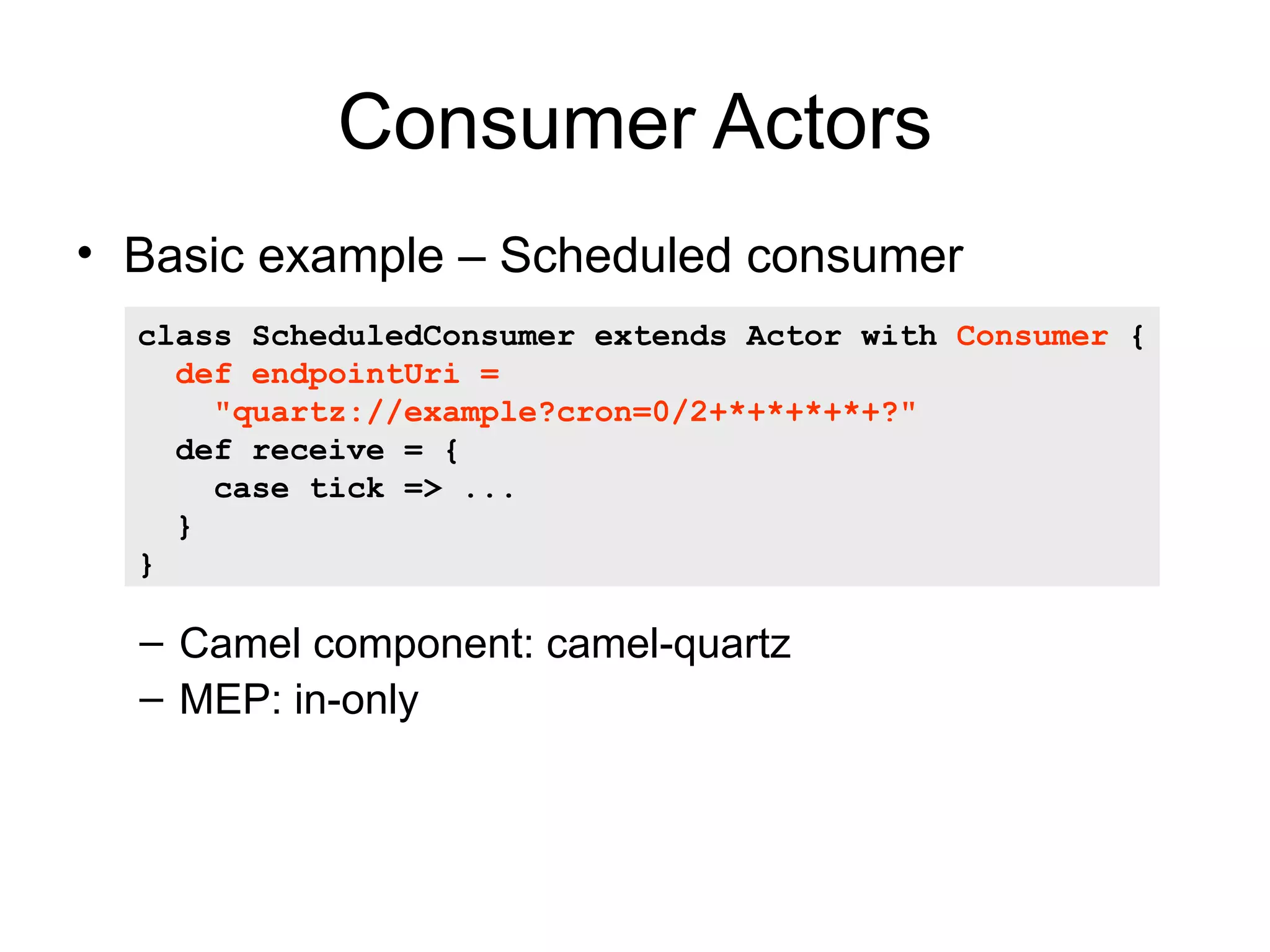
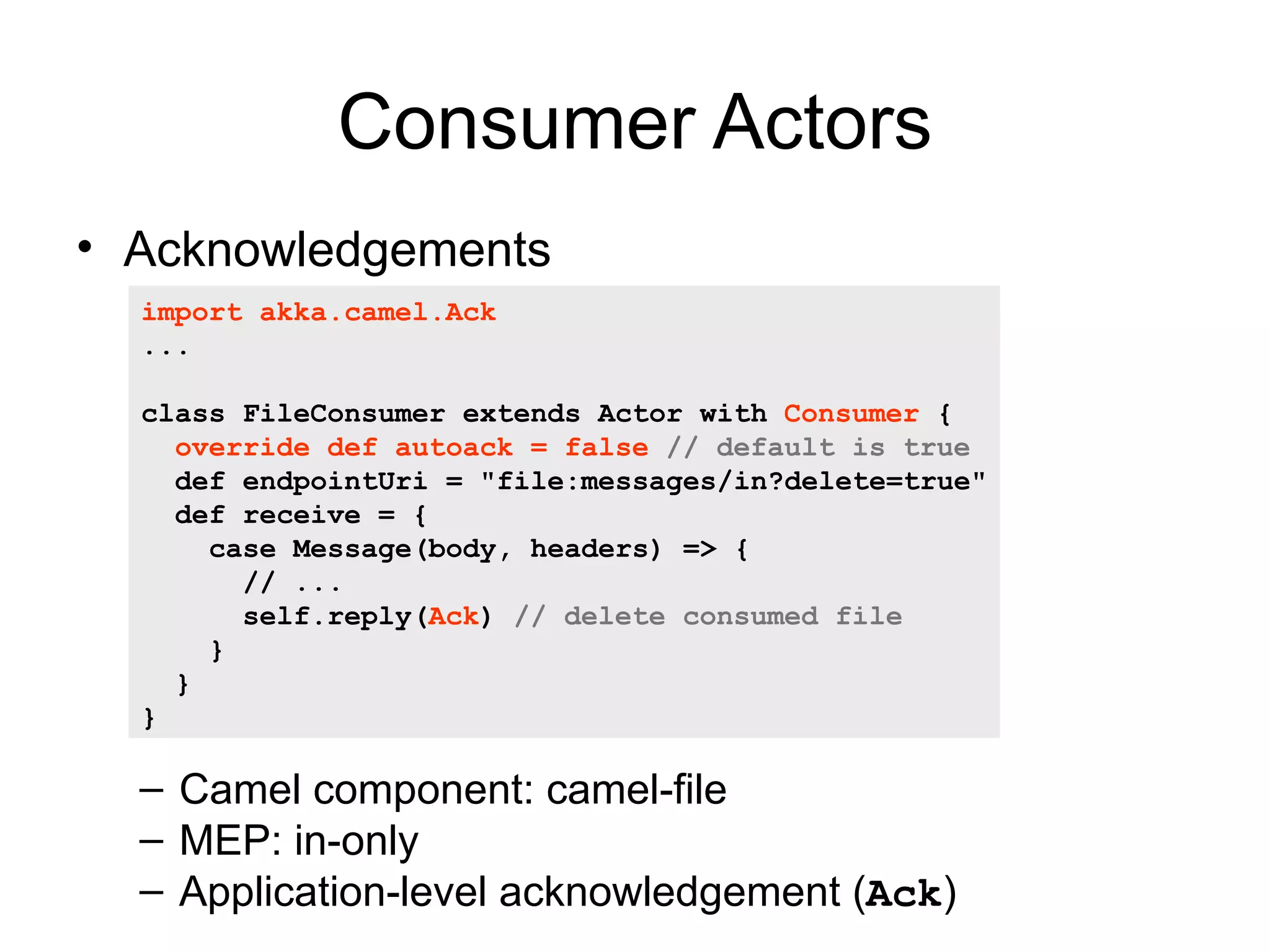
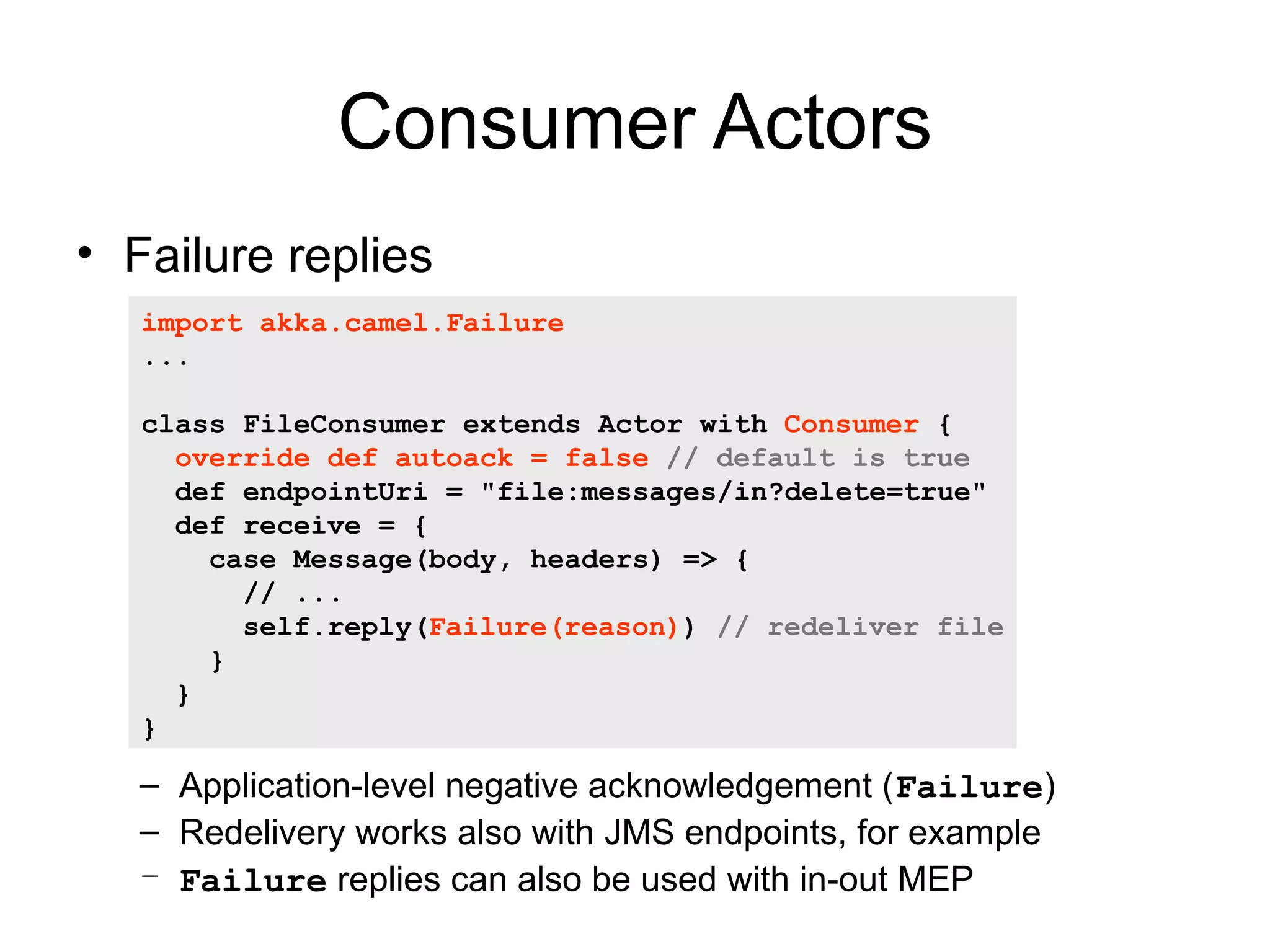
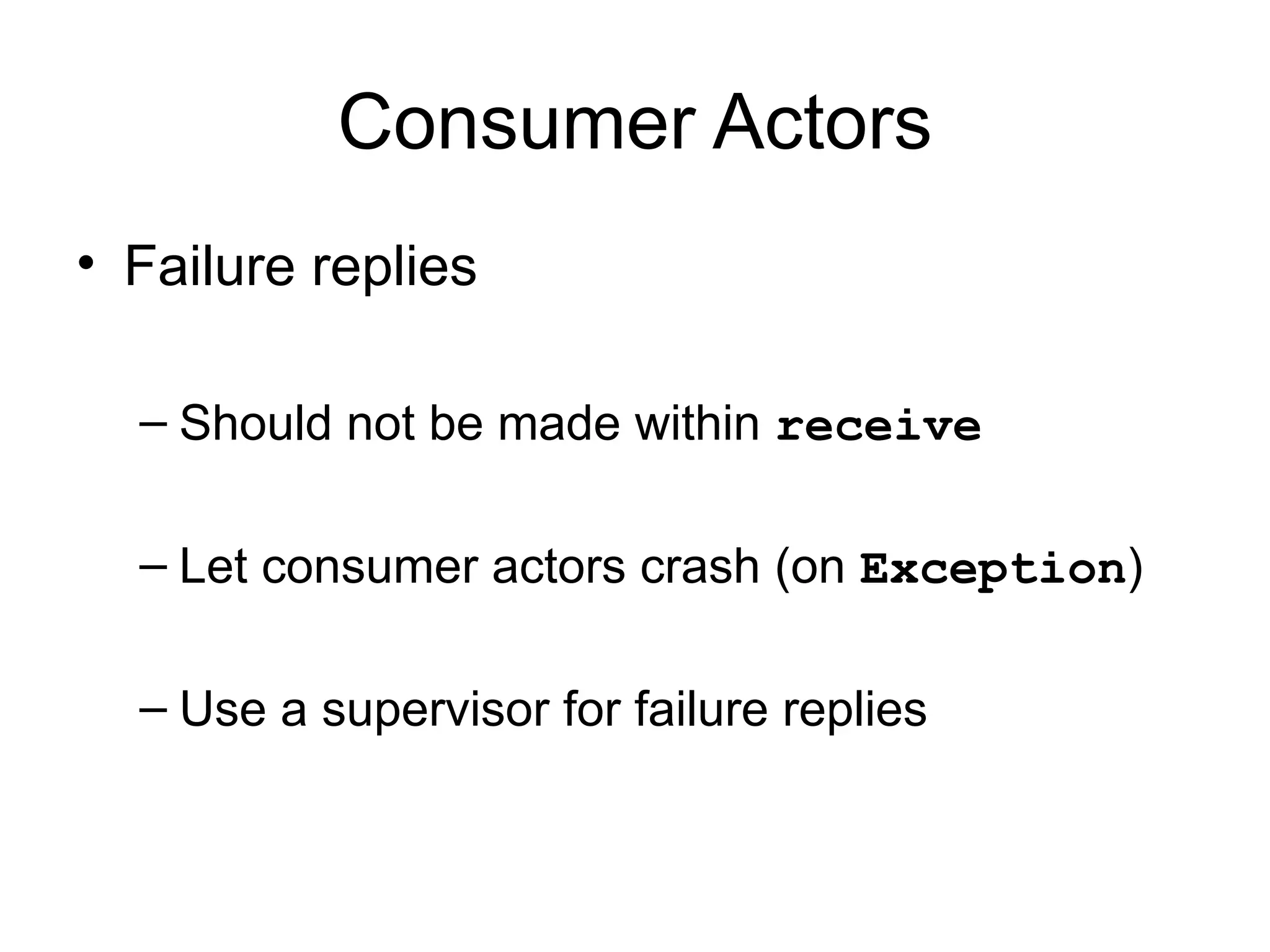
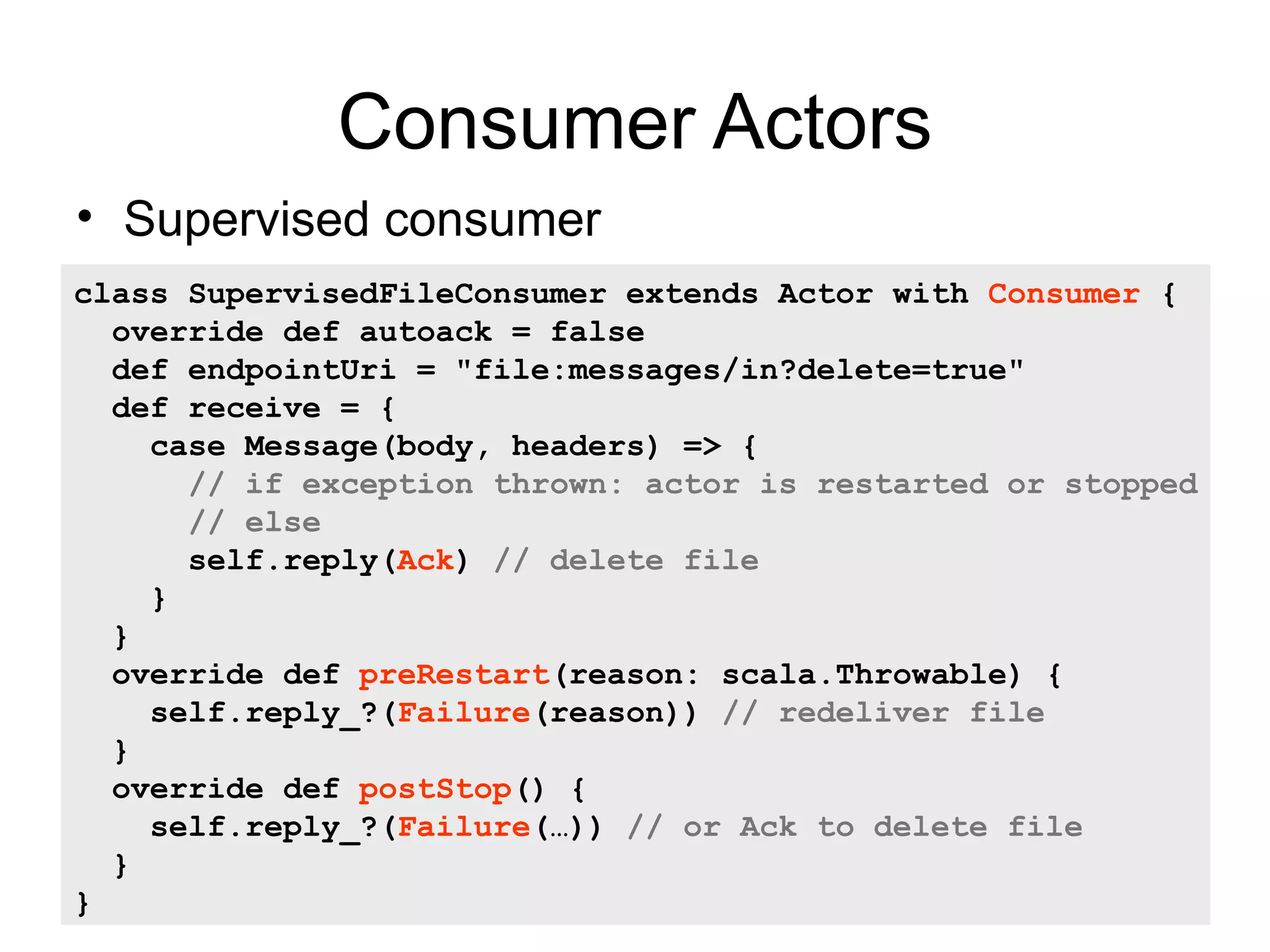
![Consumer Actors • Supervised consumer import akka.actor._ import akka.config.Supervision._ // Create consumer actor reference val consumer = Actor.actorOf[new SupervisedFileConsumer] // Create supervisor for consumer actor val supervisor = Supervisor( SupervisorConfig( OneForOneStrategy( List(classOf[Exception]), 5, 10000), Supervise(consumer, Permanent) :: Nil)) – Restart on any Exception – 5 restart attempts within 10 seconds](https://image.slidesharecdn.com/scalax-2011-akka-camel-110617133702-phpapp01/75/System-Integration-with-Akka-and-Apache-Camel-31-2048.jpg)
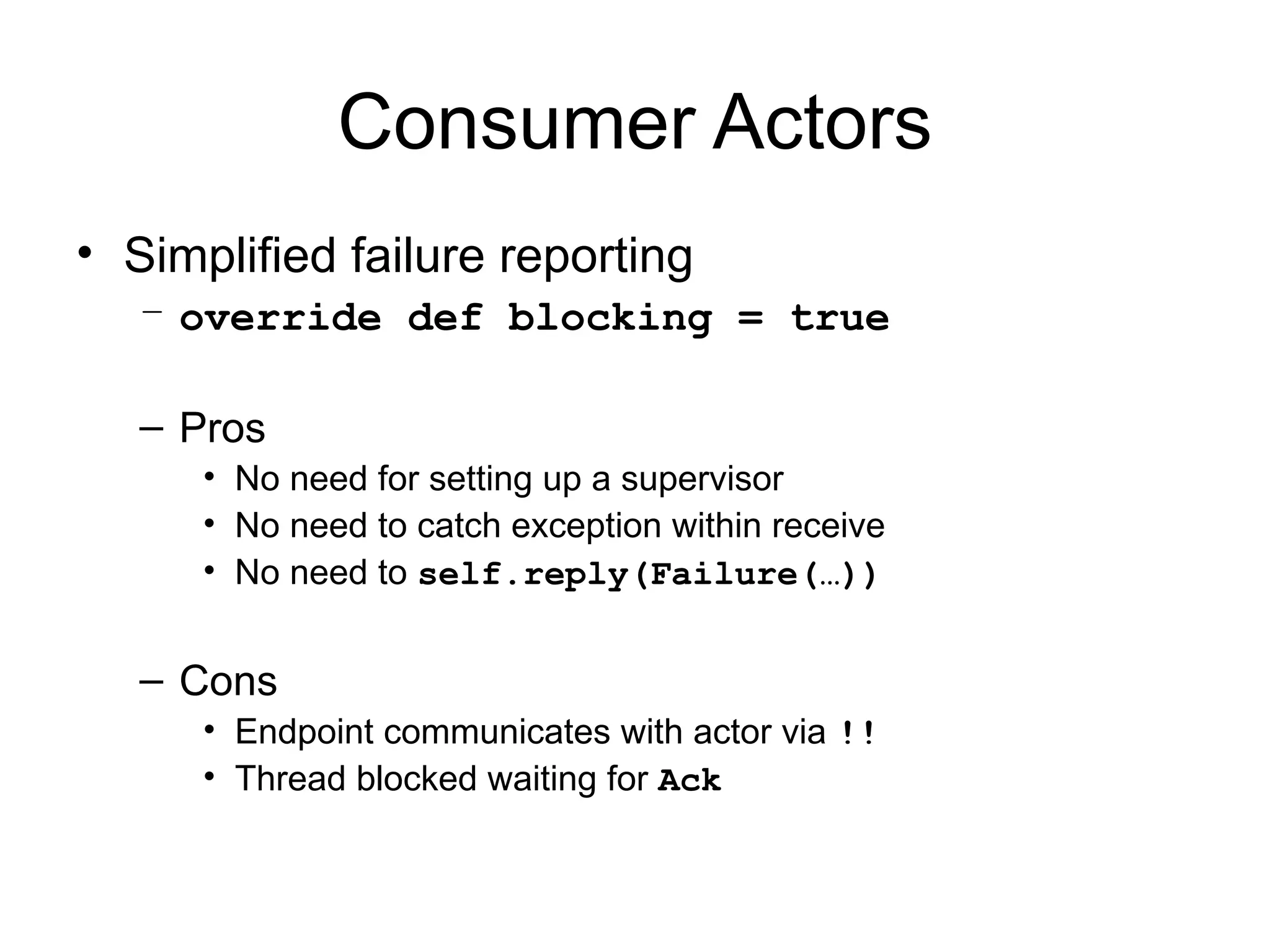
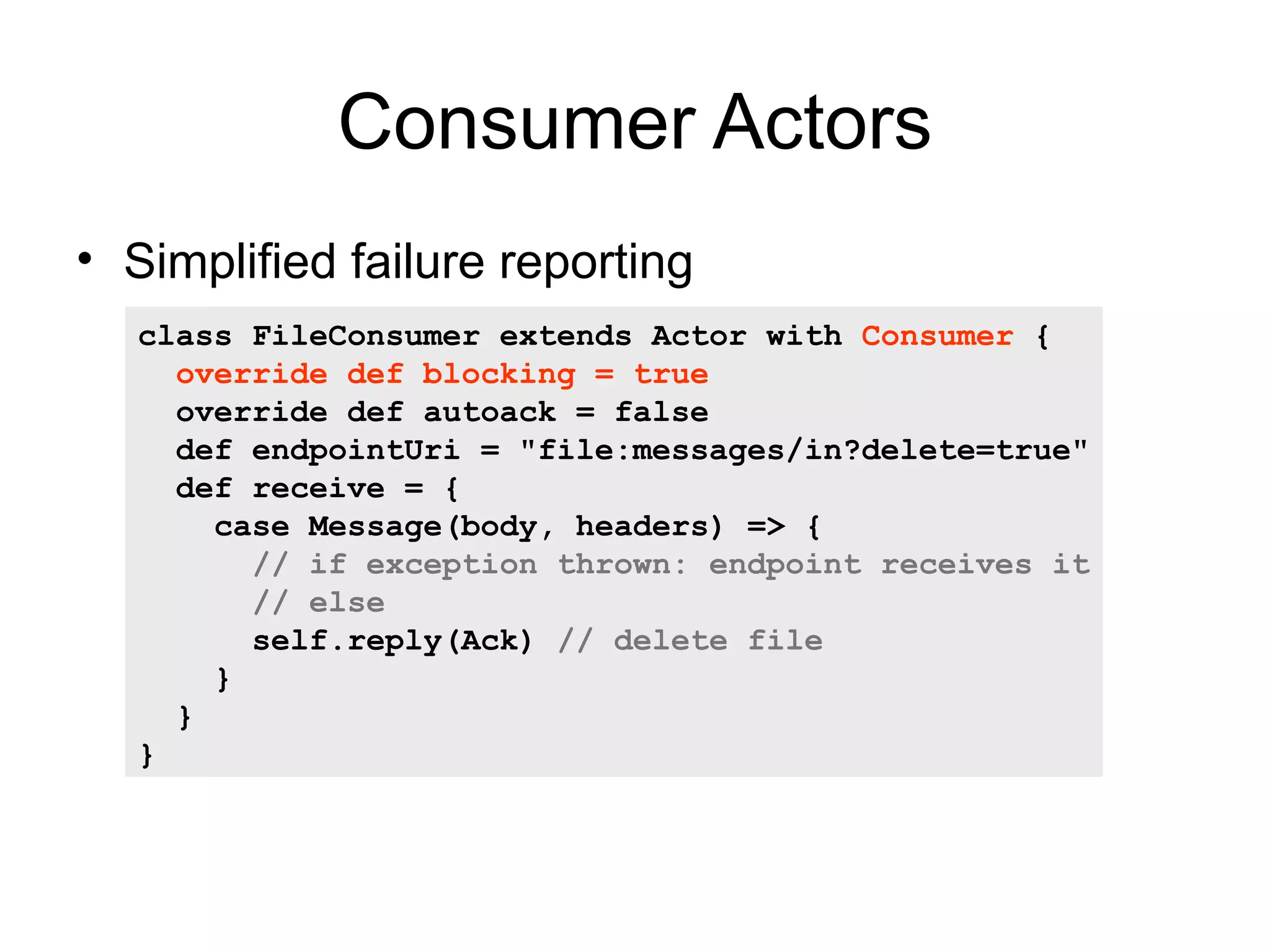
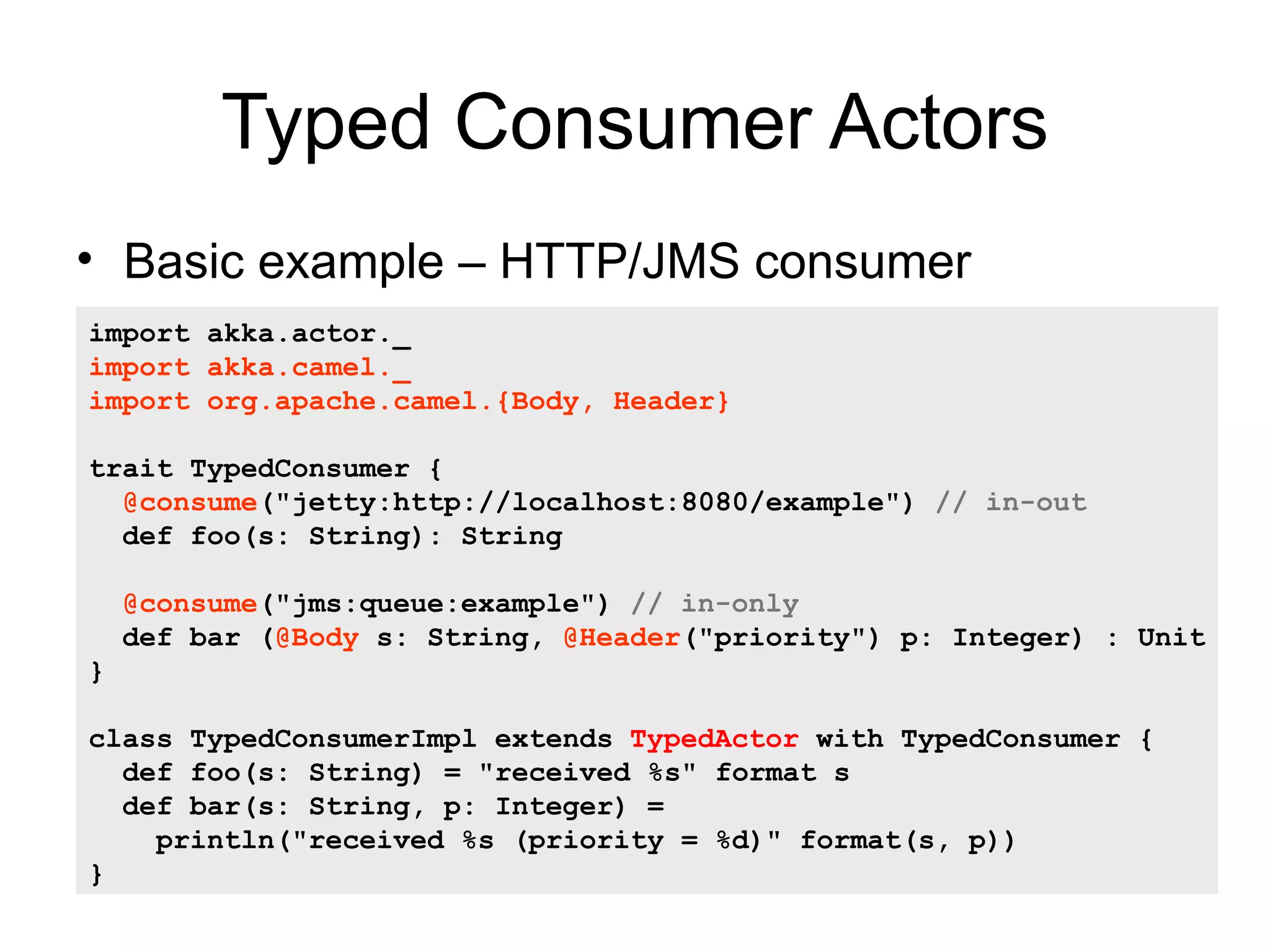
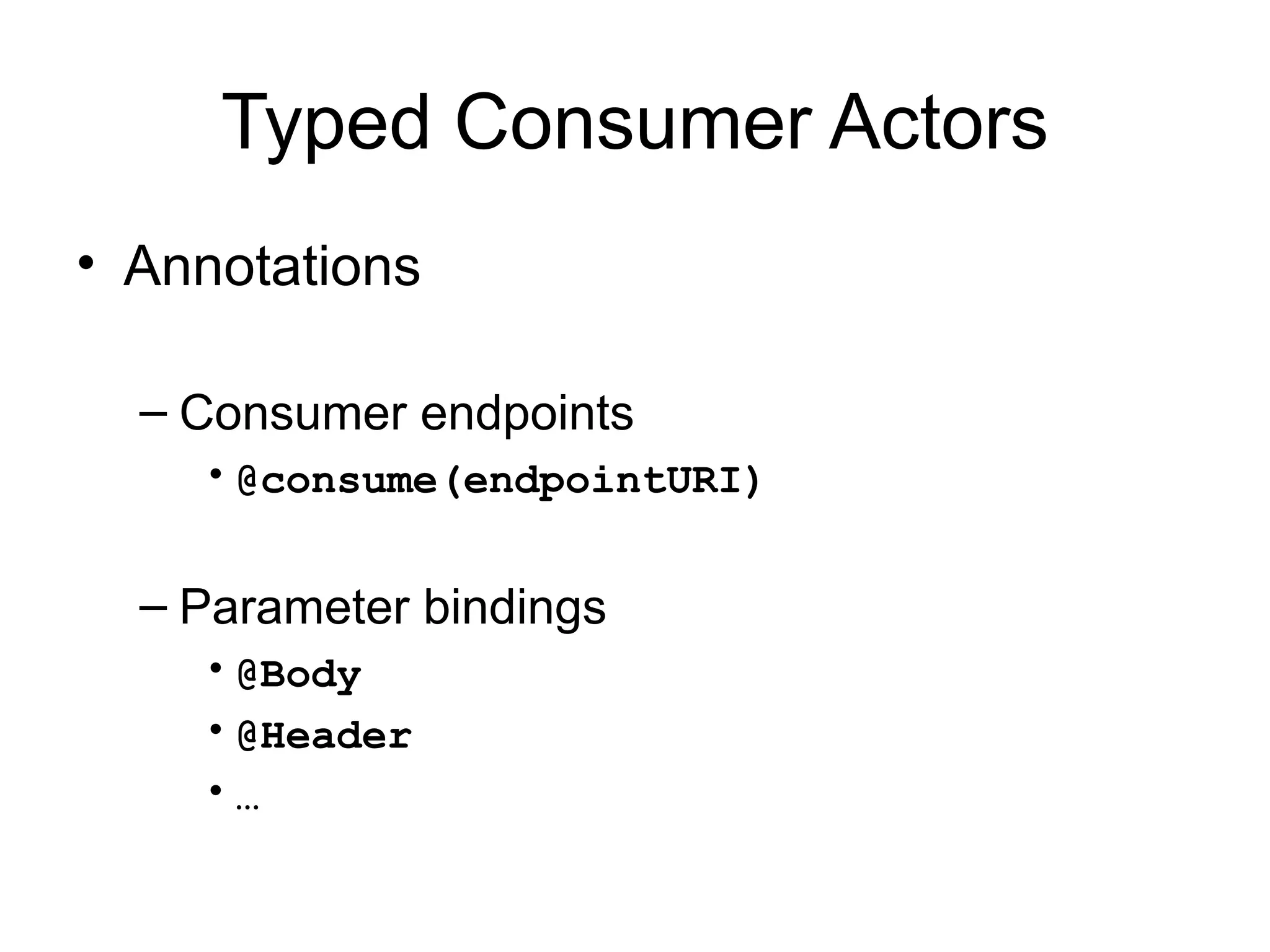
![Typed Consumer Actors • Basic example – HTTP/JMS consumer activation import akka.actor._ import akka.camel._ val service = CamelServiceManager.startCamelService // Activate HTTP and JMS endpoints (asynchronously) TypedActor.newInstance( classOf[TypedConsumer], classOf[TypedConsumerImpl]) // … or wait for HTTP and JMS endpoint activation service.awaitEndpointActivation(2) { TypedActor.newInstance( classOf[TypedConsumer], classOf[TypedConsumerImpl]) }](https://image.slidesharecdn.com/scalax-2011-akka-camel-110617133702-phpapp01/75/System-Integration-with-Akka-and-Apache-Camel-36-2048.jpg)
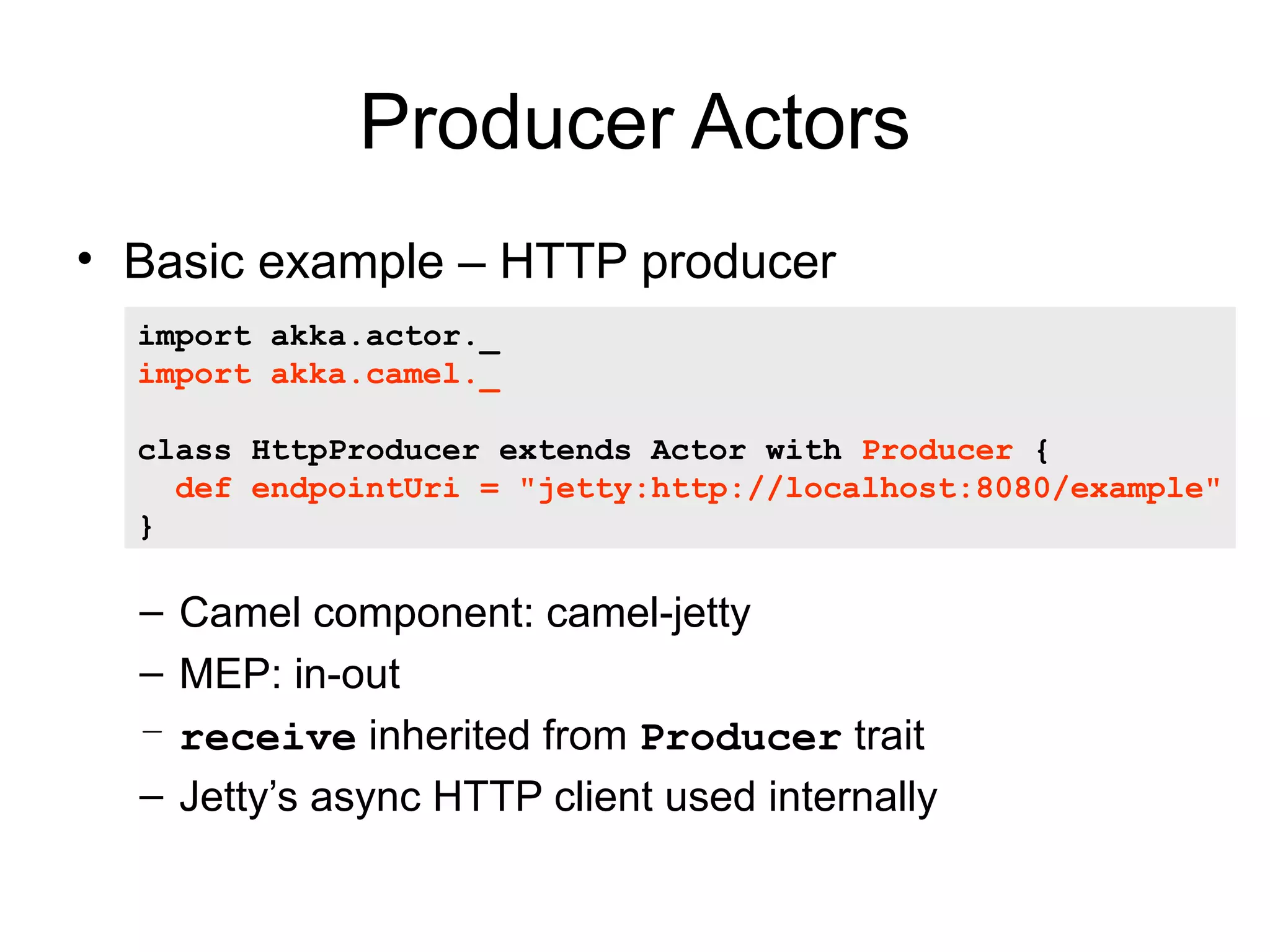
![Producer Actors • Basic example – HTTP producer activation import akka.actor._ import akka.camel._ // Producer actors require an initialized CamelContext CamelServiceManager.startCamelService // activate producer actor val producer = Actor.actorOf[HttpProducer].start // POST test message to http://localhost:8080/example producer !! "test" match { case Some(m: Message) => … case Some(f: Failure) => … case None => … } // ! and !!! can also be used](https://image.slidesharecdn.com/scalax-2011-akka-camel-110617133702-phpapp01/75/System-Integration-with-Akka-and-Apache-Camel-38-2048.jpg)
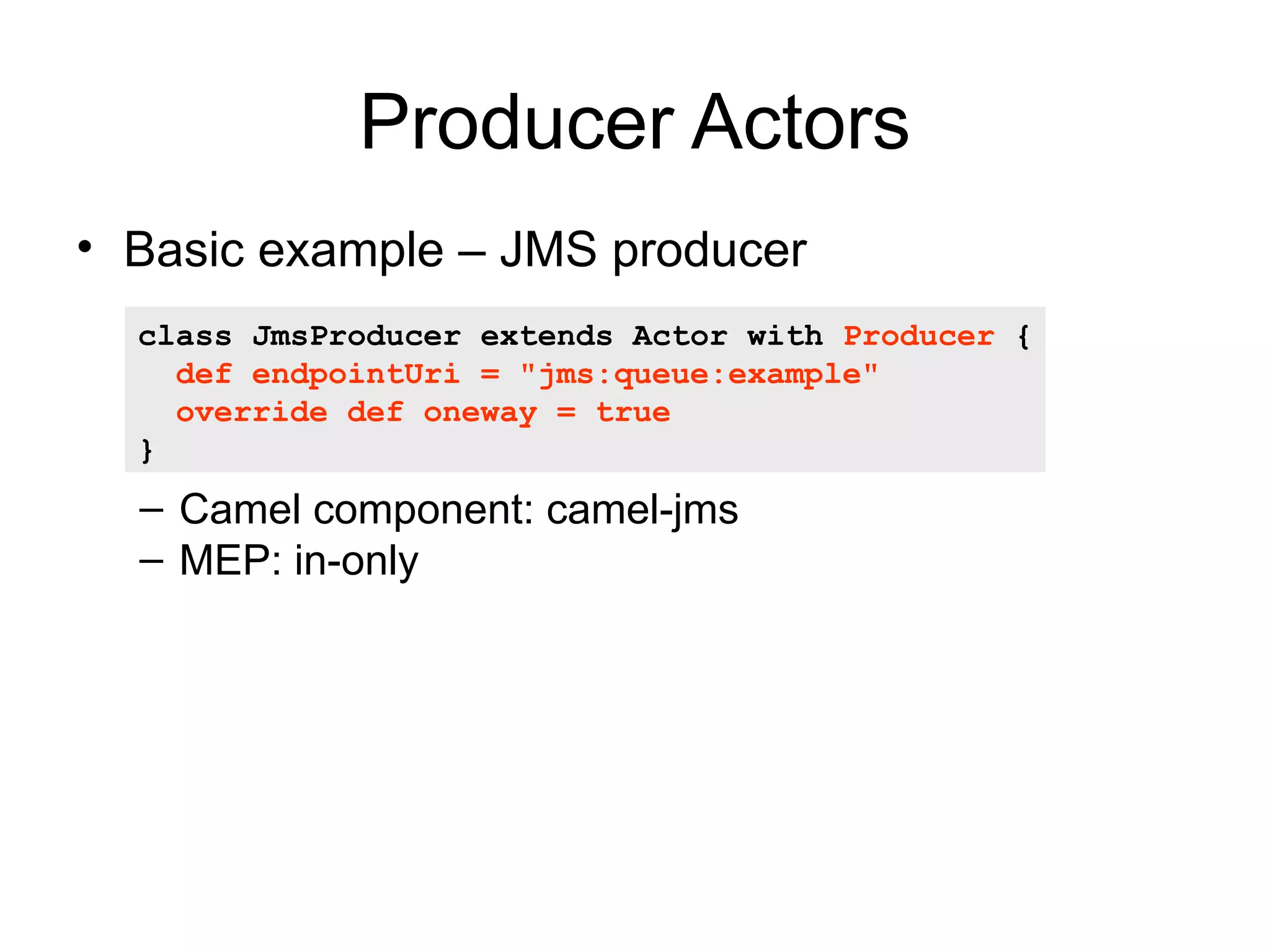
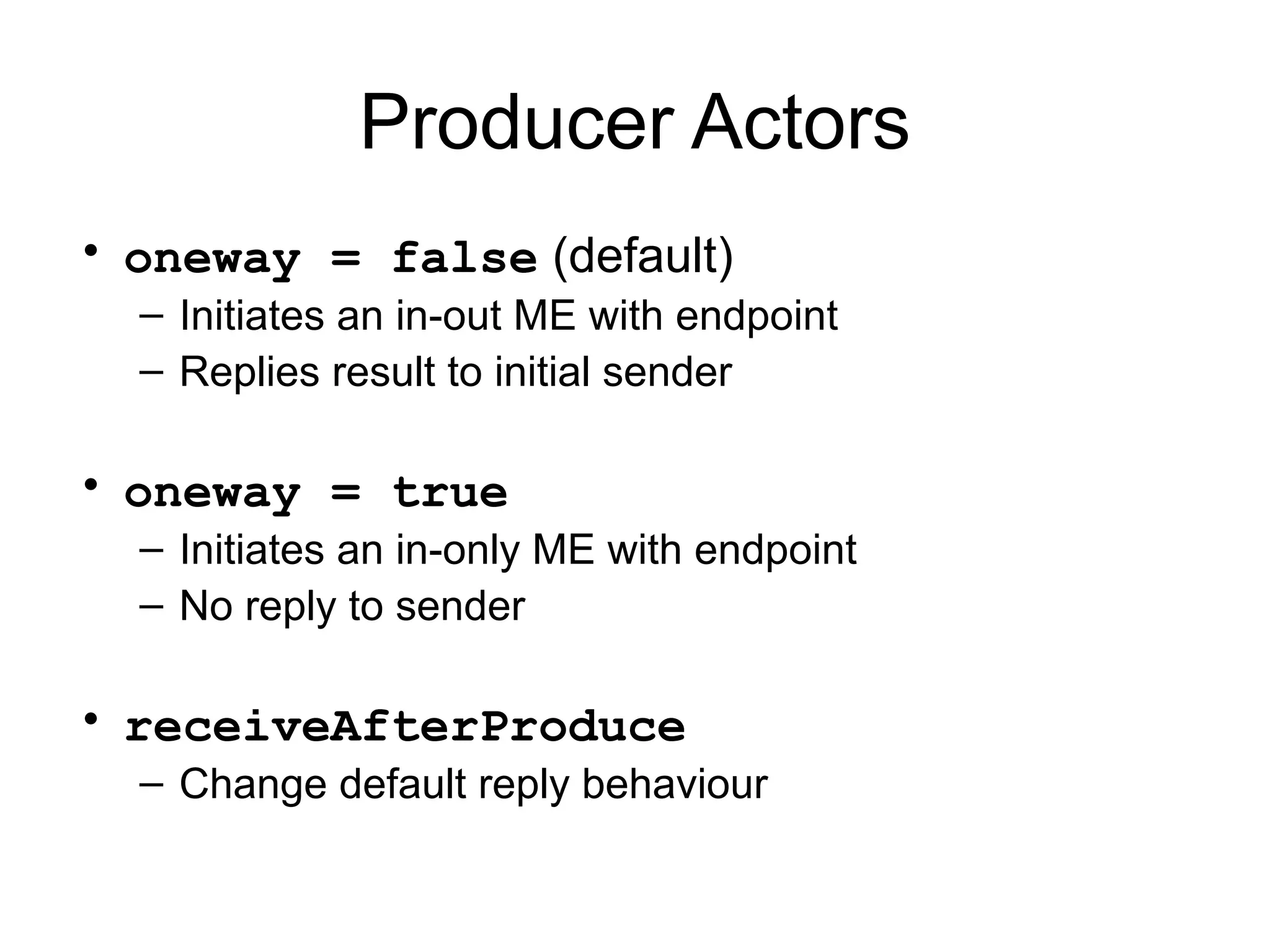
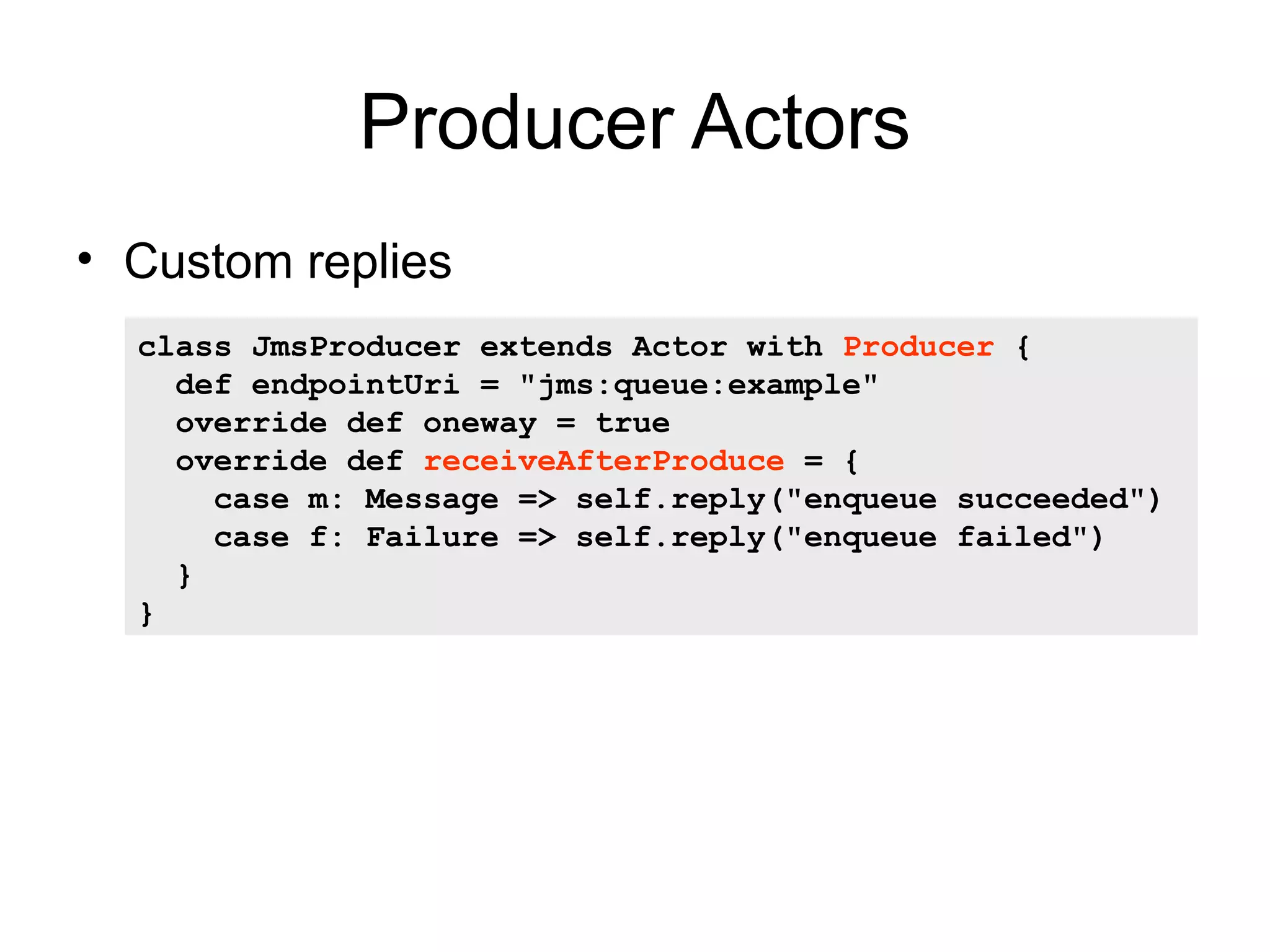
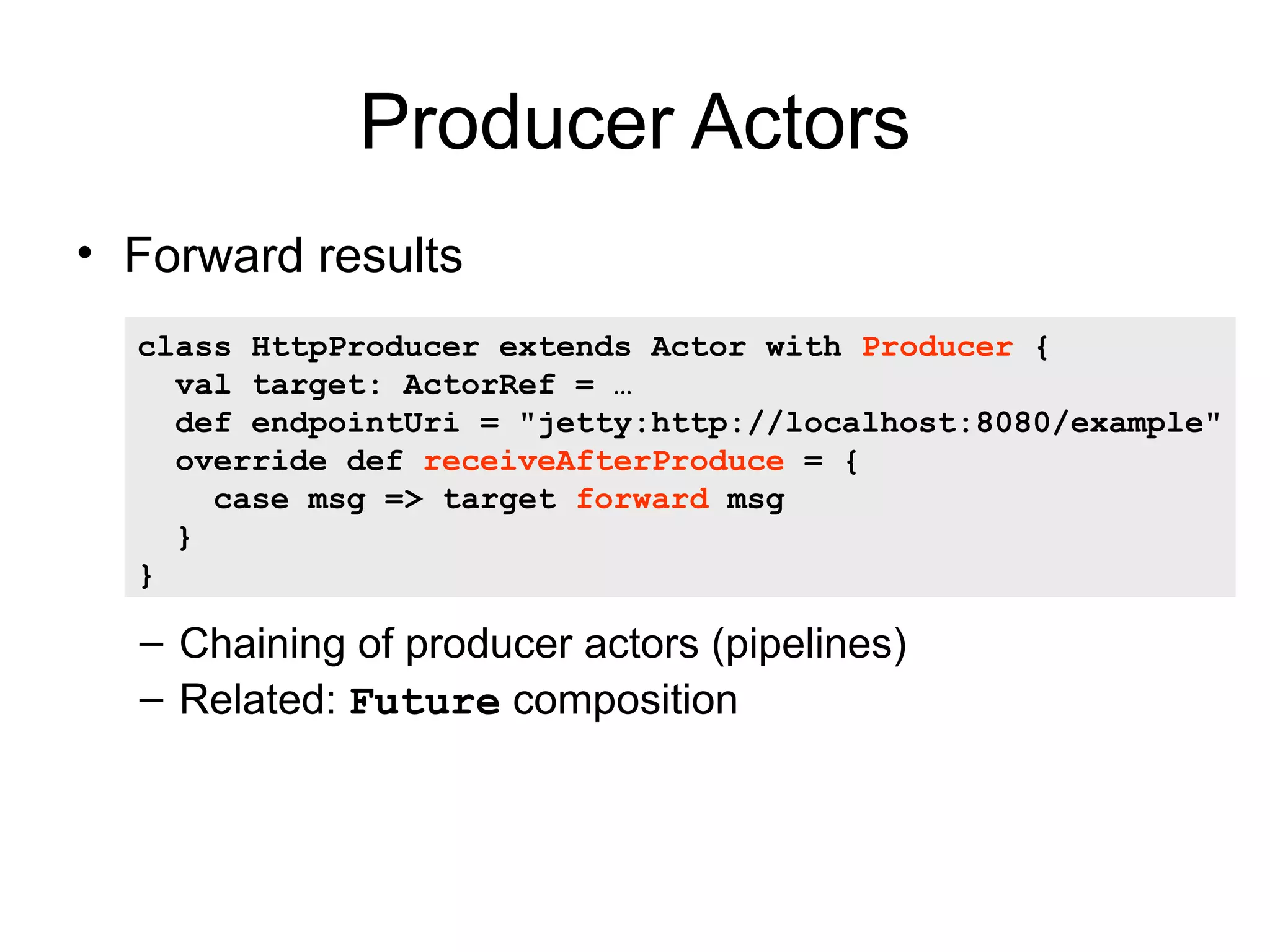
![Producer Actors • Future composition val producer1 = Actor.actorOf[HttpProducer1].start val producer2 = Actor.actorOf[HttpProducer2].start // monadic future composition (non-blocking) val future = for { m1: Message <- producer1 !!! Message("test") m2: Message <- producer2 !!! m1 } yield m2 // blocks until result is available – Producer Message val result: pipeline = future.get](https://image.slidesharecdn.com/scalax-2011-akka-camel-110617133702-phpapp01/75/System-Integration-with-Akka-and-Apache-Camel-43-2048.jpg)
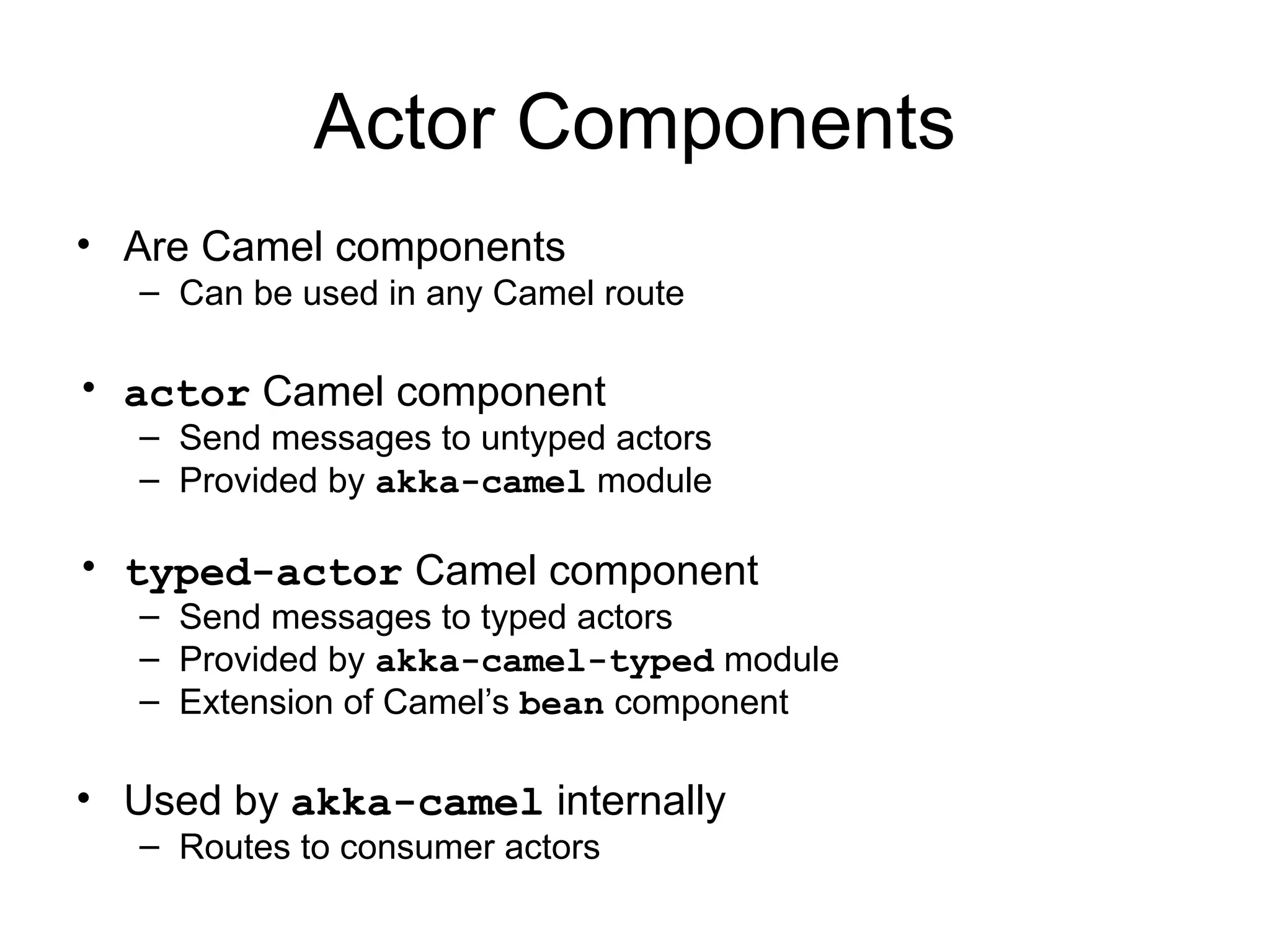
![Actor Components • actor endpoint URI – actor:uuid:[<actor-uuid>][?<params>] • Parameters – autoack: Boolean • System or application-level acknowledgements – blocking: Boolean • Use ! or !! for sending messages to actor • Supported message headers – CamelActorIdentifier • Dynamic routing to actors](https://image.slidesharecdn.com/scalax-2011-akka-camel-110617133702-phpapp01/75/System-Integration-with-Akka-and-Apache-Camel-45-2048.jpg)
![Actor Components • Example import akka.actor._ // can be any actor (no need for Consumer) val actor = Actor.actorOf[SomeActor].start // ... // Camel route from JMS endpoint to actor from("jms:queue:example") .to("actor:uuid:%s?autoack=false" format actor.uuid) – actor receives messages of type Message](https://image.slidesharecdn.com/scalax-2011-akka-camel-110617133702-phpapp01/75/System-Integration-with-Akka-and-Apache-Camel-46-2048.jpg)
